For the longest time I coveted a 50mm f/1.4 Nikkor AIS. This yearning began in art school, where photography was the family member that drank too much at Thanksgiving and was consequently relegated to the tutelage of an old hardline photojournalist adjunct who would go on to somehow insult the department chair and be phased out for some Holga-shooting MFA grad who’d never had a real job. But by then my prejudices had been formed: Nikon made the best gear, and the best focal length was the 50mm, the best 50mm was the f/1.4, and the best 50/1.4 was of course the AIS because it was the most recent manual focus lens. Autofocus was for sissies.
But unlike apparently everyone else at art school, I wanted to actually get a job doing, you know, the thing I went to school for. And in the mid-2000s, that meant not only autofocus, but digital capture. We were all sissies now. Worse, we were sissies with a crop factor. My rinky-dink 50mm f/1.8 AF-D was now an awkward 75mm plastic wonder lacking the versatility of a fifty or the sick bokeh of an eighty-five. So what good, in these tiny-viewfinder’d times, would be an old manual focus Nikkor?
I limped along with my 2.8 zooms like all the other newspaper hacks, until I parted ways with my newspaper, along with all the hacks in the Art department, the hacks in Editorial, and most of the hacks over at the other paper in town, too. It was almost as if the newspaper industry were in decline.
I’d been shooting weddings on the side for years, so I bought a tie and went full time. It was the ultimate sell-out. But the funny thing was, I felt more like an artist than ever before. And, unlike most of a photojournalist’s subjects, the couples I was shooting actually wanted me to be there. My photos made them happy!
But now it wasn’t enough to make good images. The market was saturated: I had to make UNIQUE images.
Thus began the descent into “character lenses.” Or, as we called them back in the day, “bad.” But this was the early 2010s and damn if bad wasn’t good again. Suddenly the measure of a lens was not how much it cost, but how little, and whether you could find it attached to a counterfeit Zorki in an antique shop. Bokeh wasn’t “nervous,” it was “swirly.” I spent hours on Flickr convincing myself that I would be the hottest photographer in this backwards town if I just bought a Helios.
The problem was that every other neurotic gearwhore had the same idea and most of these lenses, which ought to come free when you buy a military surplus rifle from a former East-Bloc nation, skyrocketed in price. And, being a professional photographer, I didn’t have any money to spend on things like lenses.
Plus, you can’t adapt unique glass to a photojournalist’s system. Moves would have to be made. Decisions decided. Enter new A7 bodies and a host of old primes. I still can’t believe I had the guts to go exclusively manual focus, but how else do you get full frame sensors behind lenses made before Watergate?
And the flagship of this new armada would be a secret weapon of a character lens that is all but forgotten: My father’s old Leica Thread Mount Canon Serenar 50mm f/1.9. It’s beautifully vintage, extremely well made, cheap as dirt, and, best of all, it’s soft, dreamy, and the bokeh looks like the inside of a tornado.
It only took a few shoots to see the problem with this plan: My main lens was soft, dreamy, and the bokeh looked like the inside of a tornado. What the hell was I thinking?
Sure, it’s great when you’re taking a portrait of the bride in front of fall leaves. But when you need that contrasty shot of the bouquet or the tack-sharp photo of the calligraphy on the place cards? Not so much. So very quickly the situation was rectified with an old Nikkor 50/1.4. After all these years, I’d finally come full circle to the lens I’d wanted in the beginning.
Except that lens sucked.
I couldn’t believe it. At 1.4 it was soft as a pancake and just as flat. Yes, stopped down it was bitingly sharp… unless you focused to infinity, where it was soft at any aperture. It threw CAs like your middle school teacher’s overhead projector and the barrel distortion completely defeated portraits at the minimum focus distance. I probably just got a bad copy that had been abused by my former photography instructor while shooting the invasion of Grenada, but that was of little comfort. I was having serious concerns about my decision to move away from modern glass. I needed something sharp, snappy, and free of distortion.
Purchasing the The Nikkor 50mm f/1.8 AIS
So that’s how I ended up purchasing the least sexy lens ever made: The Nikkor 50mm f/1.8 AIS. Too mundane an aperture for the speed junkies, with bokeh too mainstream for the hipsters, it falls right in the no-man’s land of plain old good lenses. As if anyone could ever be satisfied with one of those.
I opened the mailbox with nothing of my usual fervor when expecting a new lens. The unboxing was similarly mundane: Yep, there it is. Sure looks like a lens. It’s got a focus ring and everything.
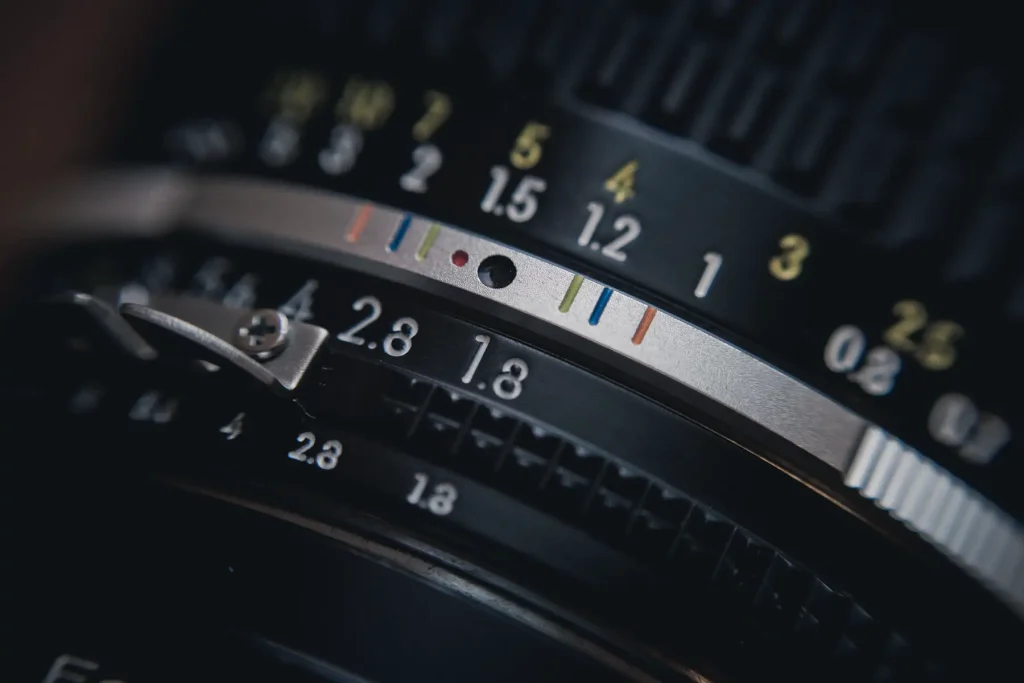
But while I yawned at the lens itself, my breathless research into various fifties had led to a rejuvenated enthusiasm for the focal length. The thing about hyperbolic puff pieces on photo blogs is that they work. Fifty millimeter, after all, was the choice of HCB and Ralph Gibson. It’s well known on rangefinderforum.com that 50mm was the focal length of Robert Capa’s right eye (the left was a thirty-five with more of a biogon feel, but he lost it in Indochina).
When the Nikkor arrived, I was about to leave on a week-long trip to Washington to visit family at Thanksgiving. The last time I went to DC, I took five cameras and eight lenses. The highlight of that trip was hauling a Pentacon 6 to the Lincoln Memorial and setting off metal detectors all the way over in the Capitol rotunda. But having spent the last week rolling in internet blather about fifties, I decided I would photograph our trip – my three year old’s first trip – with only a 50mm lens.
I ALMOST took the Seranar. Wouldn’t it be meaningful to use my dad’s lens on a family trip? Yes. But it would also be irreplaceable. We’d be crammed into one room with my very curious kid who is obsessed with my cameras and whose hands are never clean. Plus, the Nikkor was just big enough that it wouldn’t fit in his mouth.
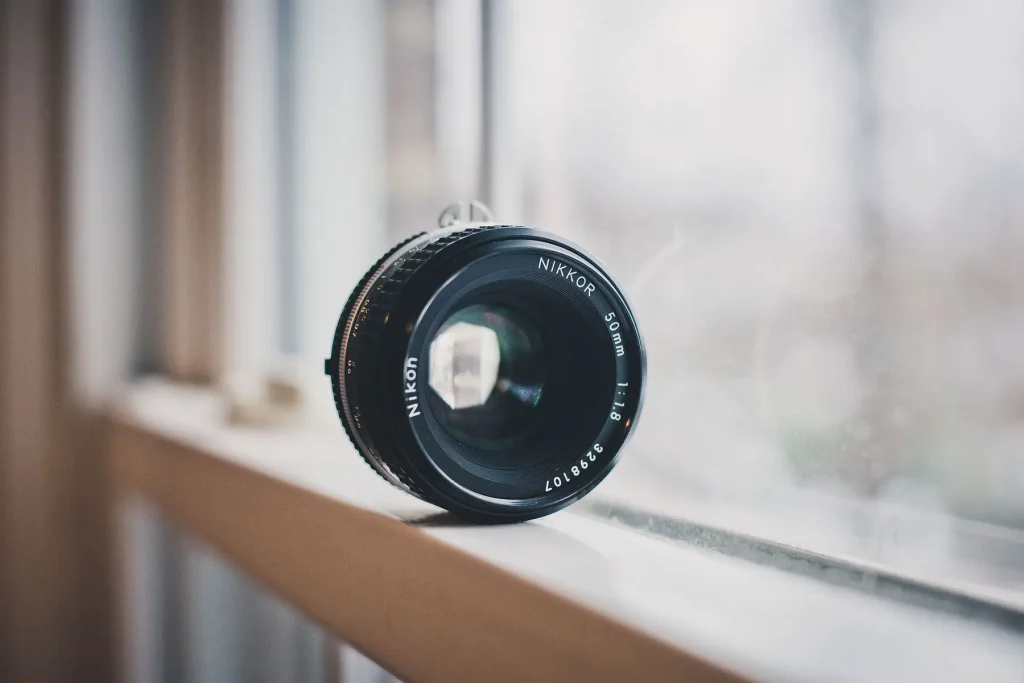
And therein lies the reason that some of the flashier fifties are not for me. The Summi-Nocti-Loxi-Whatevers are very nice, I’m sure. But not only can I not afford them, I REALLY can’t afford to replace them. A lot of folks on the fora seem to think that pros buy whatever lenses we want, but the truth is that we are probably even more concerned than the average user about the cost-benefit ratio of a lens. Never once have I had a client comment on my bokeh or request a certain kind of rendering. Sometimes a nerdy groomsman will take interest in my gear, but on balance consumers of photography don’t care about how photographs are made. The ephemeral signature of a lens isn’t truly lost on the viewer, but it’s definitely washed into the totality of the image-making.
A fifty should be cheap. It is, by definition, a standard lens. Spend the cash on exotic focal lengths. But if I win the lottery I’m getting the Voigtlander.
The Thanksgiving trip
So as we hit the road to one of the most photographed cities on the planet, I had a sub-$100 lens from the ‘80s on my cutting edge mirrorless camera. And that was fine, because we spent most of the next 48 hours in traffic on I-95. Can you imagine being three years old and getting stuck in a traffic jam for an entire day? Now imagine that 50% of your parents are hell bent on documenting every damn thing you do because photographers can’t put the camera down for fear that they might have to actually be present in the moment.
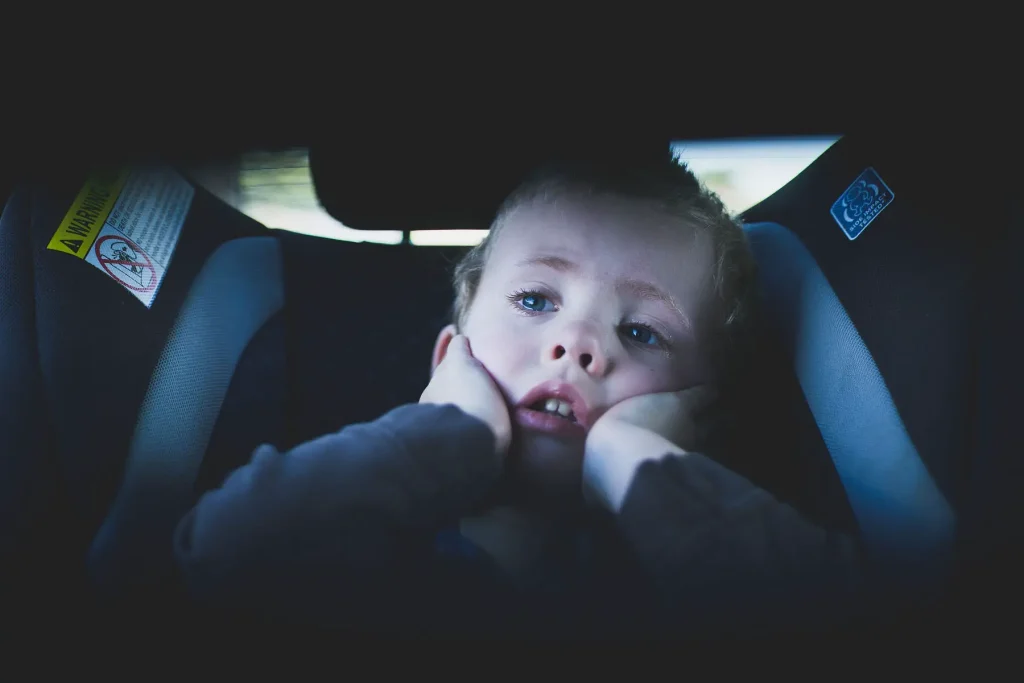
My son is named Atticus and he was a preemie, which means that he has a few issues and that we are helicopter parents. Most notably, he is on the Autism spectrum, and we shelter him from things that freak him out, which we really shouldn’t do, but when you pull into a hotel at midnight after driving all day and your son is terrified of the elevator, you take the stairs. We don’t know why he’s scared of hotel elevators and he won’t tell us. He likes other elevators. It’s a mystery.

Atticus sees things differently. And I wanted to shoot the trip not just as a photographer, or a dad, but from his perspective. He doesn’t care what Washington is to the rest of the world. He cares that it’s a stupidly long drive, but eventually he’ll get to see his family and a bunch of new places. And people will probably give him toys and good things to eat.
But enough of this human interest crap, let’s talk about gear! We’re photographers, after all. Why go on about the emotional subtext of our imagery when we can just look at a 100% crop of a completely banal photo?
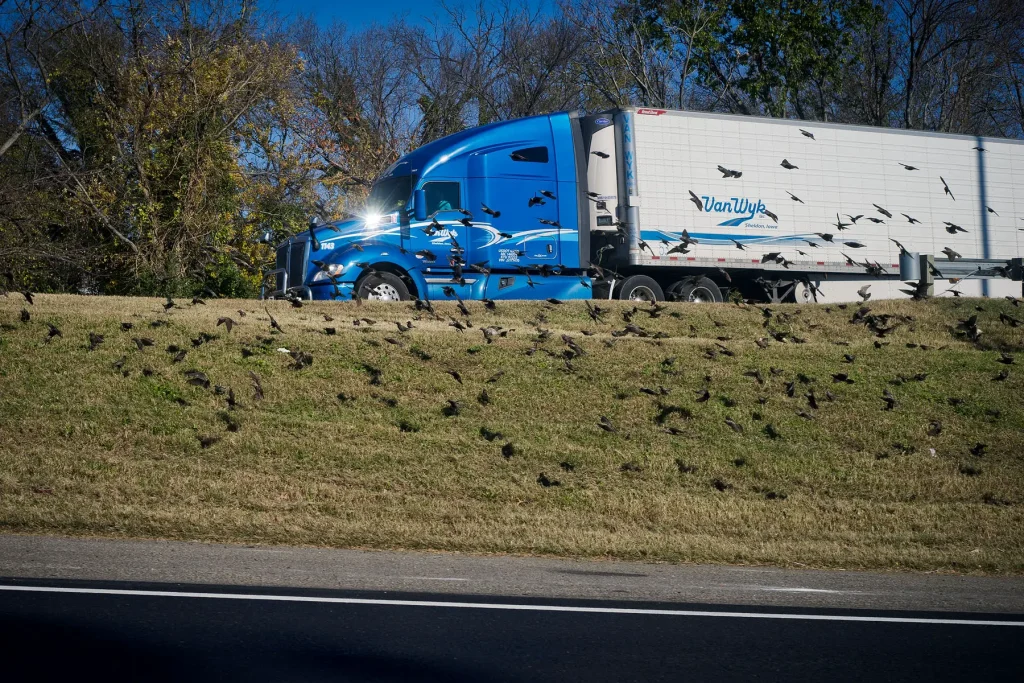
To answer the first question everyone always asks about a lens, yes, the Nikkor 50/1.8 AIS is sharp. Incredibly, ridiculously sharp. It’s sharp wide open, stopped down, at infinity and at close range. I didn’t check the corners because no one cares about the corners. If you want sharp corners use a copy machine.
The shot above was taken at f/8 in a moving car through the passenger window at another moving vehicle with a killer flare right in the middle of the frame. Perfect test conditions. Here’s the crop:
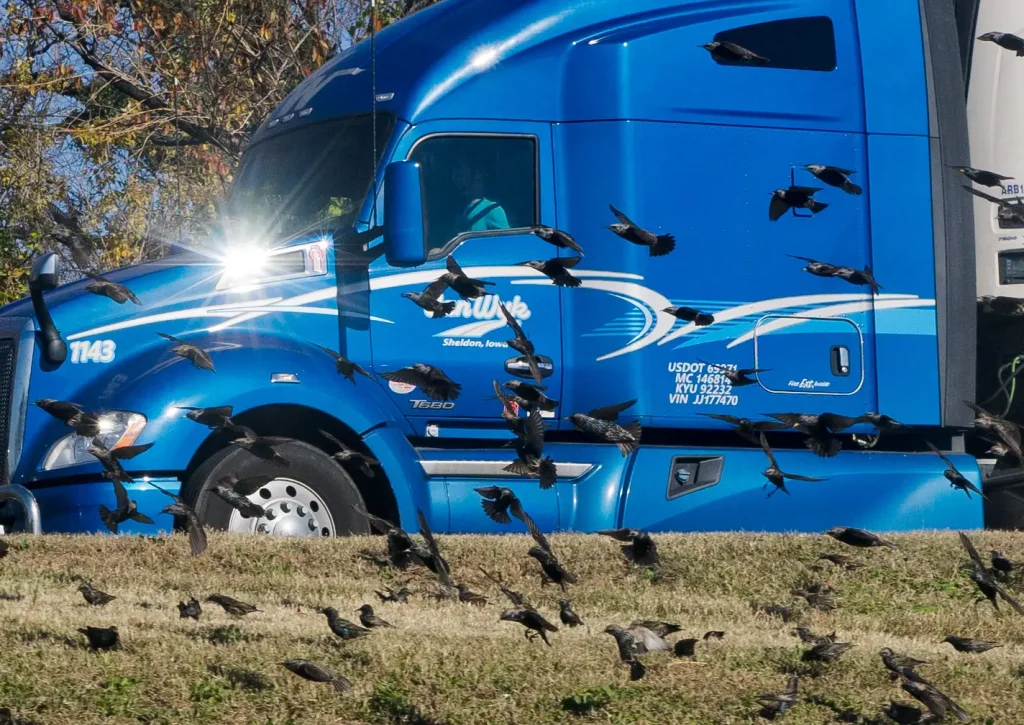
Here’s another shot wide open. Yes, I know I focused on the wrong eye. I’m a pro, I can break the rules.
So that gets the pixel peeping out of the way and now we can actually talk about using this lens. It handles like what it is: A gorgeously well-made SLR lens of the past. This is the long-nosed, early version of the lens. Many regard it (that’s how photographers say “I read it on the forums”) as Nikon’s best 50mm f/1.8, but I’m going to jump way out on a limb here and guess that this lens has the same optical formula as its successor, my old plastic 50/1.8 AF-D. Same crispness, same feel, same accurate-to-the-point-of-sterility rendering. But the AF-D had better flare control. The focus throw on the AIS is luxuriously smooth and shorter than you might expect. The aperture ring clicks positively in full stops, but you can balance it between stops if you’re that picky about it. The front element is recessed enough to forego a filter for protection if you don’t have kids.
In other words, it’s your typical nifty fifty. Cheap, sharp and boring. Compact, but not small. Fast, but not really fast. It wasn’t high-end enough to be a pro lens, and it’s too commonplace to develop a cult following.
What little character the lens has is about as far out of vogue as you can get: I’m talking of course about its seven-bladed aperture diaphragm, which results in, if you can believe it, heptagonal rendering of the out-of-focus highlights. That’s right: Its bokeh balls aren’t even balls. Nor are they bubbles, and even though there might be some pronounced edges, they’re not onion rings, either. They’re freakin’ stop signs.
I know stop signs are actually octagons, but that’s not the point. If you take a picture of someone with light sources in the background, you’re gonna get a whole lot of polygons floating around, destroying your credibility as an artist. You’ll never work in this town again. And if you ever get caught posting any of these shots in a photography forum, you better be using a throwaway account, cause the ban hammer will come swinging for you.
A walk
I bolted for a walk right after we arrived. We were staying in Georgetown, and like the tourist that I was, I wanted to go see the stairs where The Exorcist was filmed. This, of course, removed me from the perspective of my son. Suddenly I was a street photographer in a big city. I quickly set about photographing the backs of people’s’ heads and juxtaposing signs with other signs.
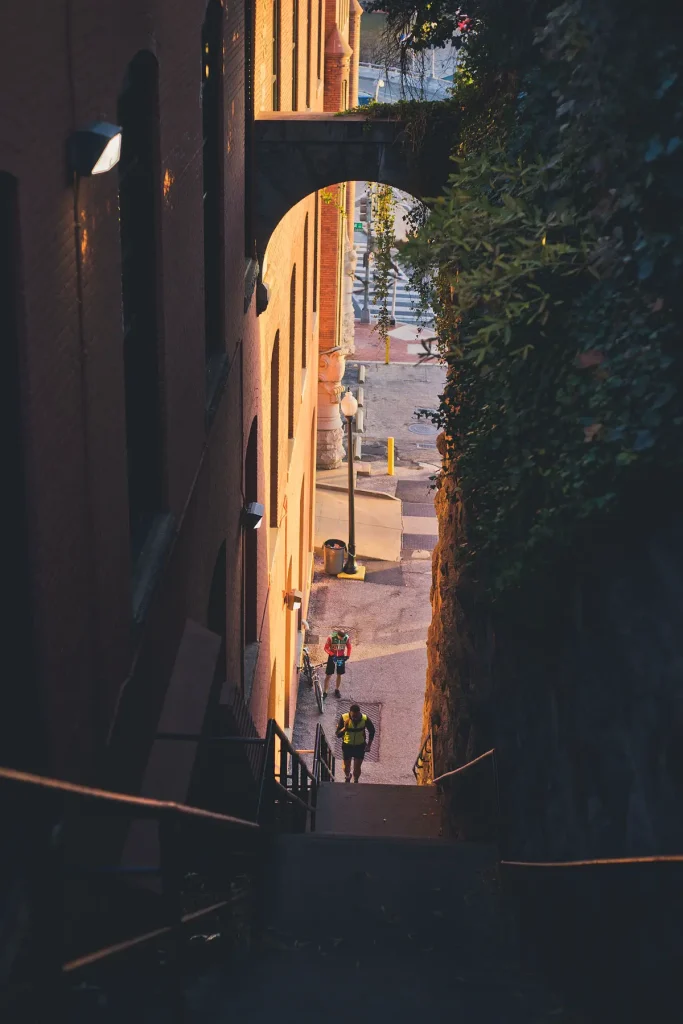
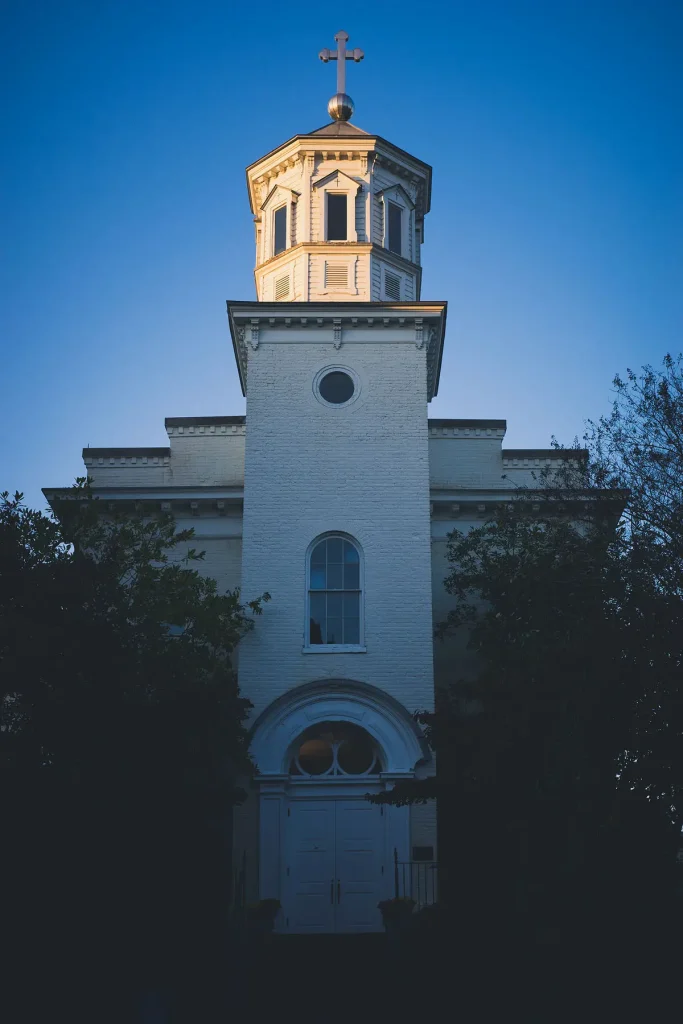
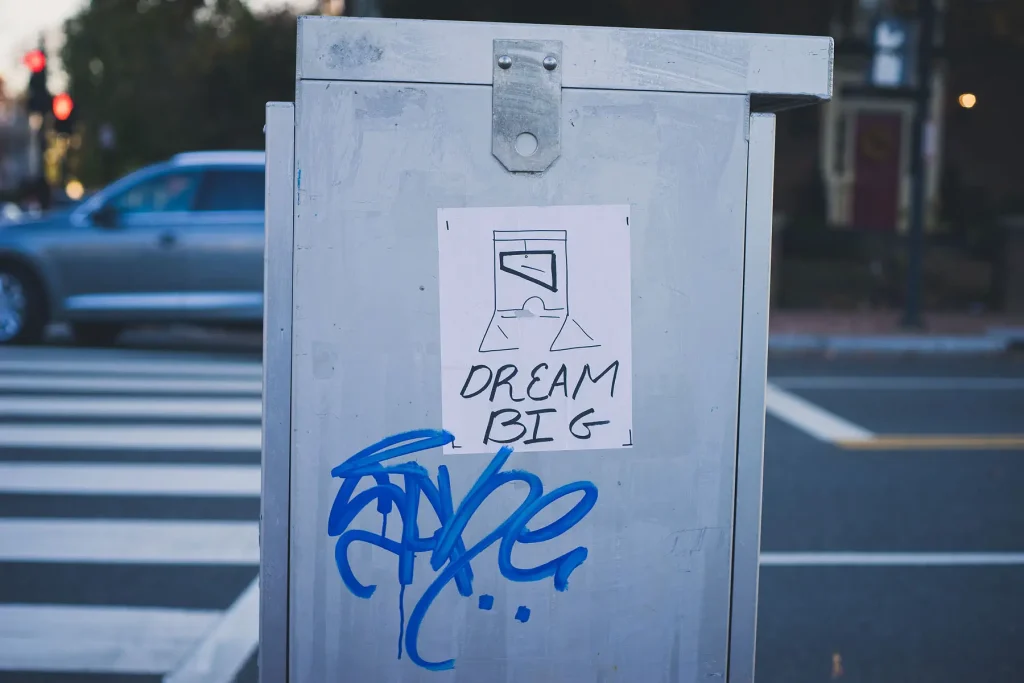
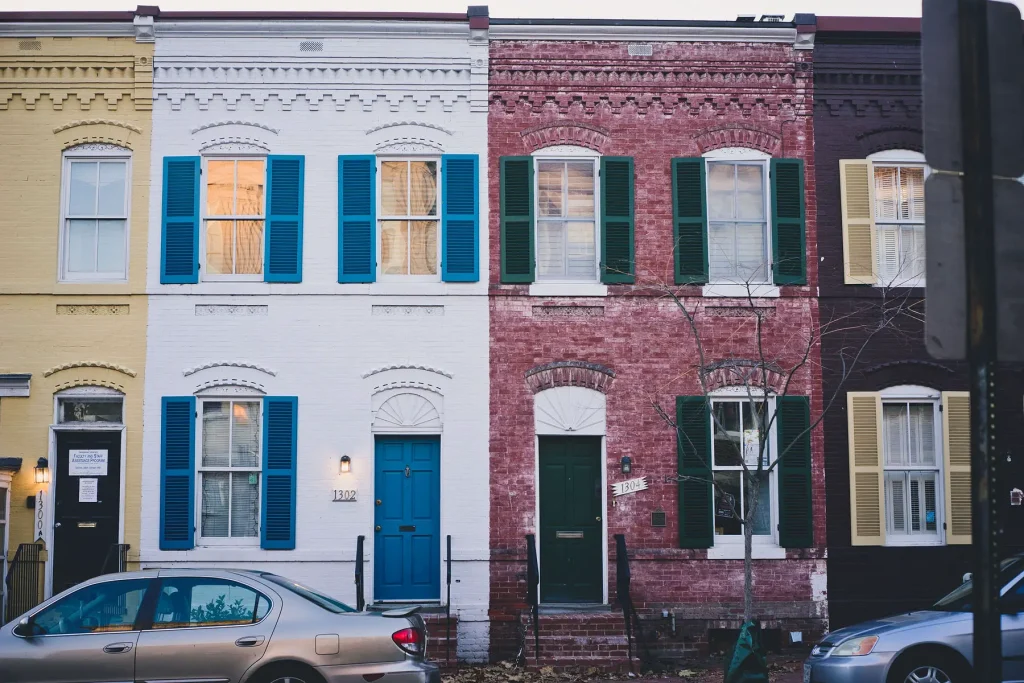
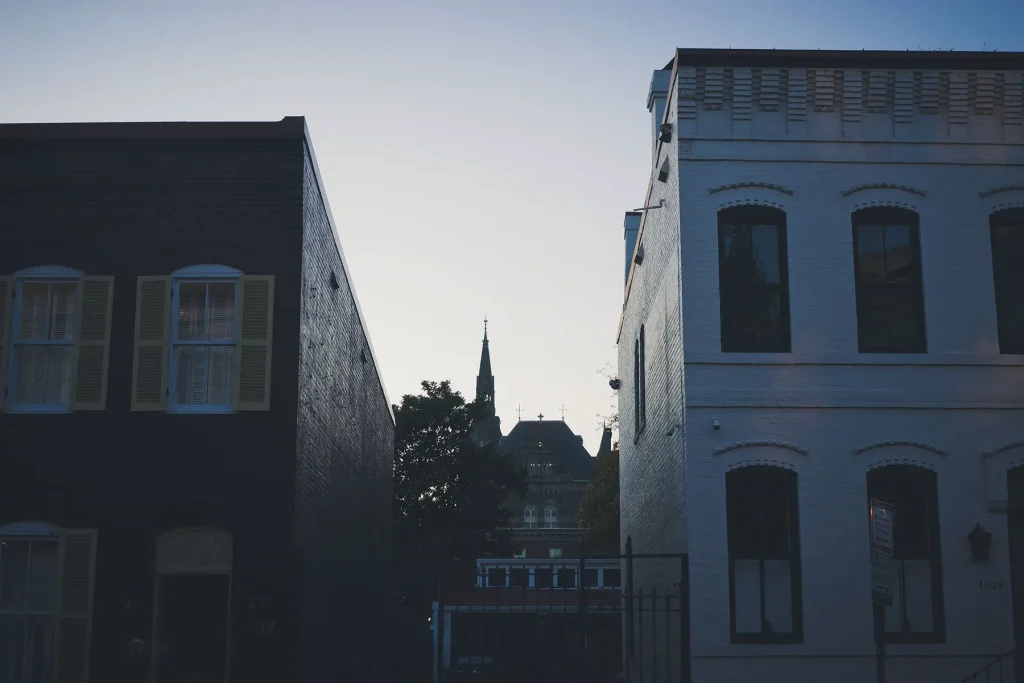
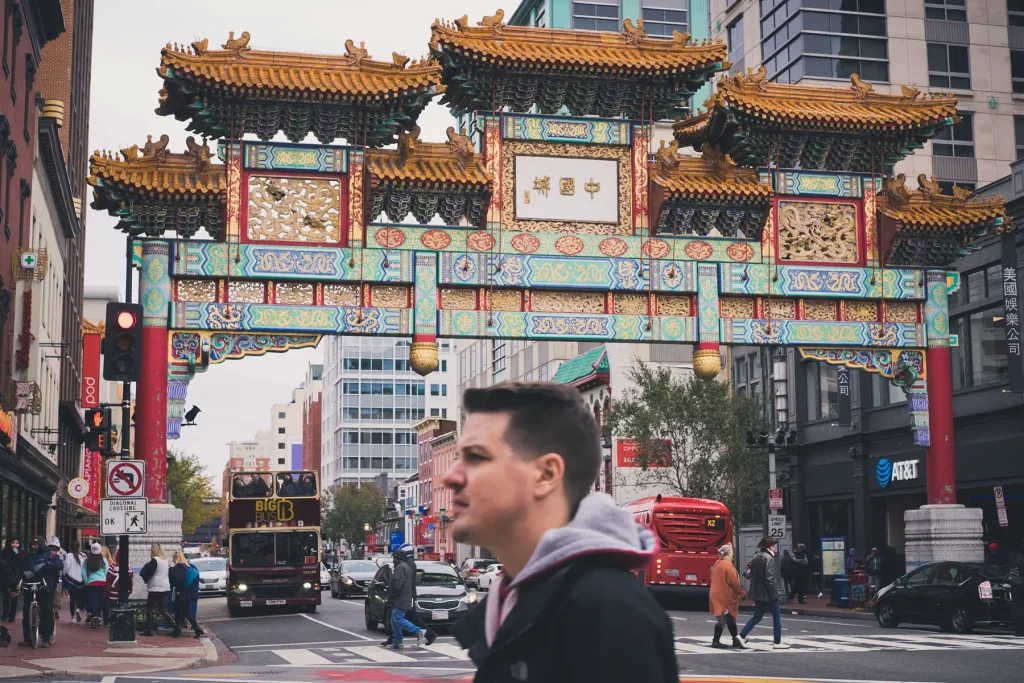
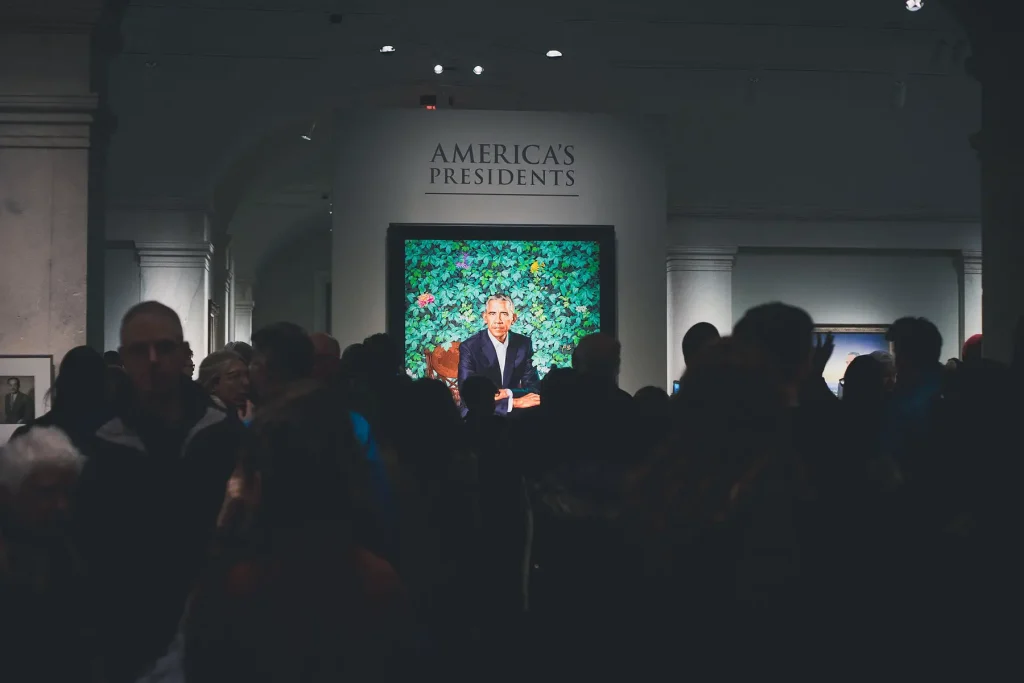
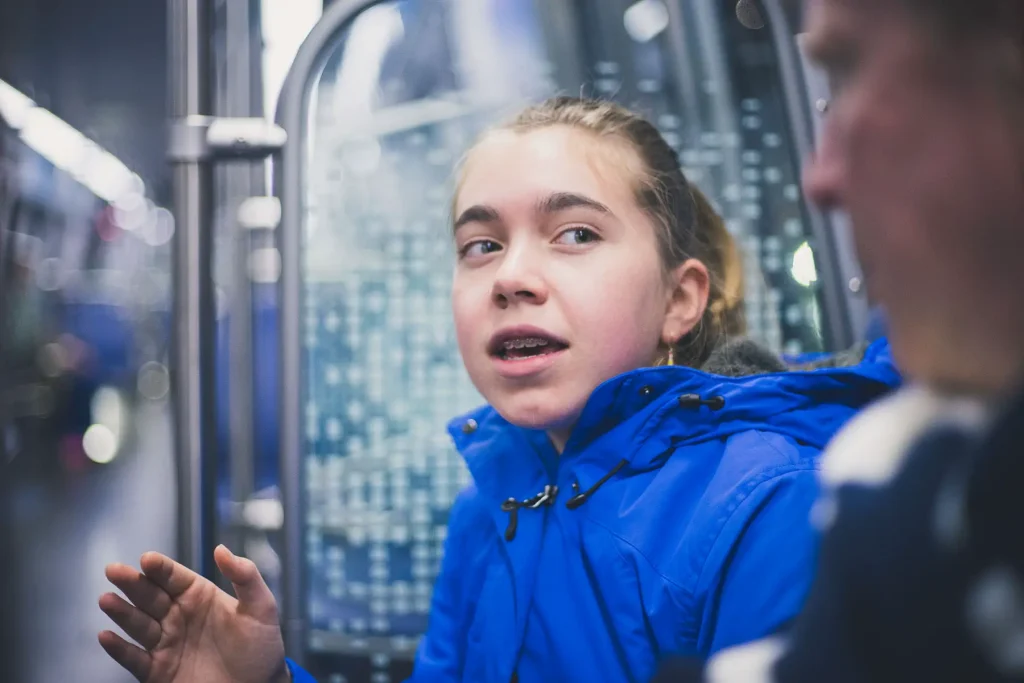
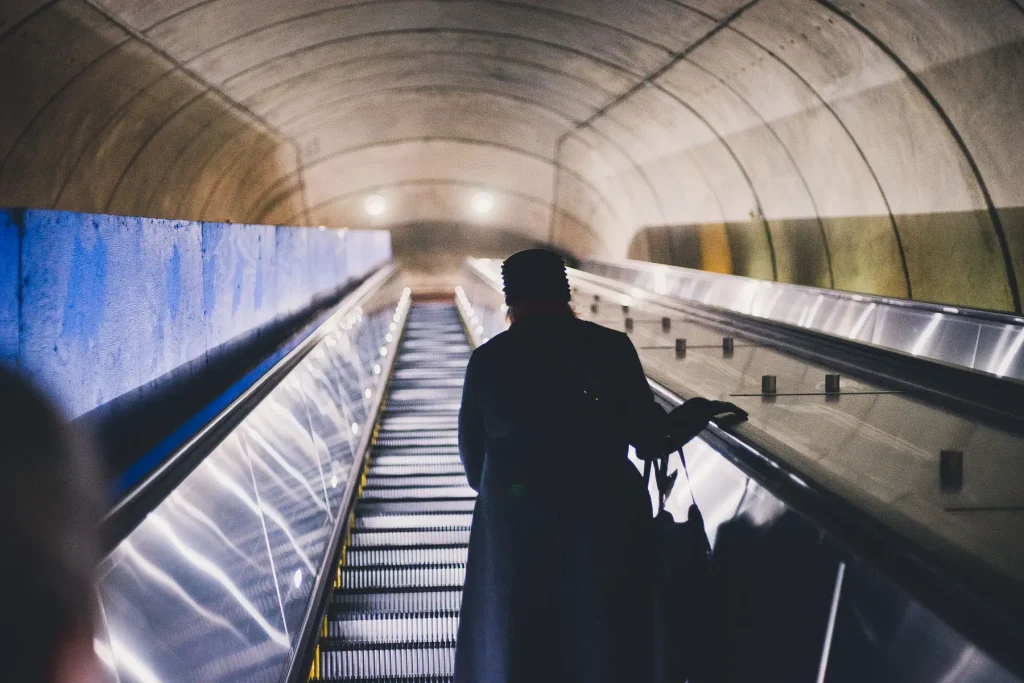
Almost immediately, I wished for a thirty-five. The streets were too narrow, and the buildings too tall. I hadn’t been in town five minutes and already I was frustrated at the limitations of my equipment. The problem with any lens is that it’s not another lens. That’s why we all have so many lenses, right? If only I’d had a wide angle I could have gotten countless shots of building mugs I found interesting only because I was a tourist. FOMO set in. I wondered if there was a vintage lens shop nearby.
But by the end of the walk I no longer noticed that my lens was too long. In fact, in some cases, it wasn’t long enough. Clearly I should have brought my eighty-five, or even my one-thirty-five. Hell, why not my old 80-200? The extra reach would be great for all the homeless people I was too afraid to get close to. Add in a second body and my abandoned 17-55 and I’d have this twenty-minute walk covered.
That’s how it happens. You know there are shots you’re missing, and you know that if you just had more gear on you, you wouldn’t miss them. But rarely do we ask ourselves if these shots are actually worth shooting. Do we even WANT to shoot these shots, or do we just feel like we should? And why should we? Who is judging this contest? Who are the other contestants?
Shooting weddings, these questions are easy to answer. Yes, you should get the shots. The judge is the bride and the competition is . . . well, your competition.
But on holiday it’s important to ask yourself who you’re shooting for, and not “because you should be shooting for yourself.” Screw that. Sometimes you shouldn’t be. I was shooting for my son, who might one day want to see pictures of himself and his family. In this far away future time I’m imagining, will my son care if I didn’t shoot the street to its fullest? I don’t think so.
Taking that further, will my son care about the way this lens renders? Will he one day refuse to pass down old family photos because they were shot with a boring lens? Of course not. So what are we really talking about here? Why do we do this to ourselves? Bokeh this and sharpness that. No one cares but you. So why do you care?
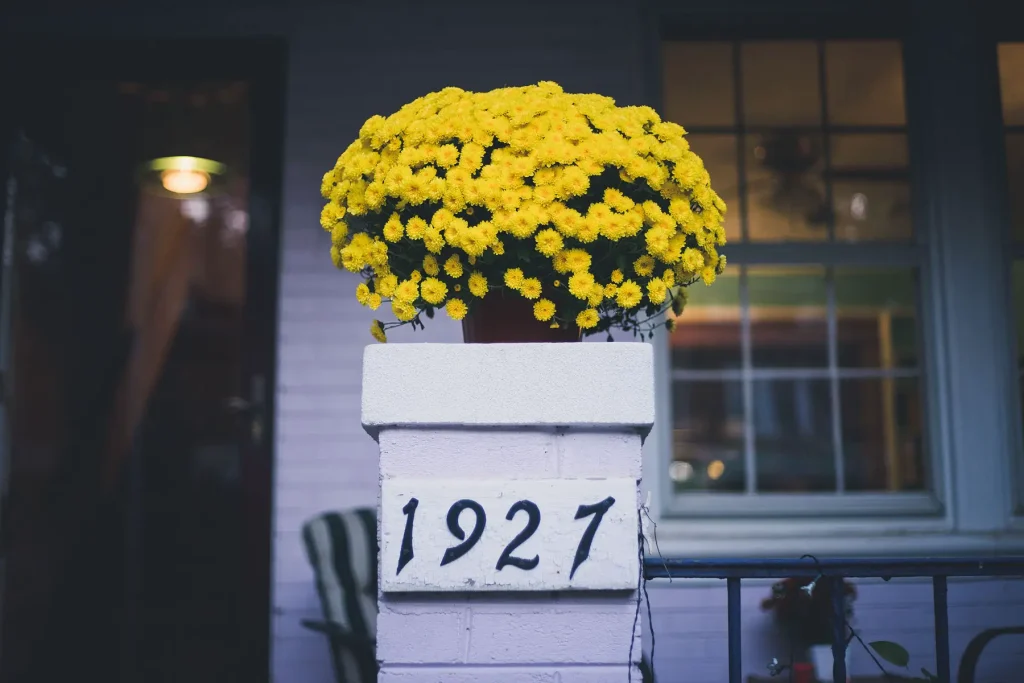
The Party
Back at the house the party was already in full swing. Atticus had been introduced to our room, which would also serve as his playroom for the next several days. It was lost on him that his two exhausted parents snoring in his playroom might put a damper on the fun. He was enraptured. Downstairs there were two pianos and family members that actually knew how to play them, not to mention a hand drum, art supplies, and a bag of ping pong balls that Great Uncle Walter liked to pour down the stairs. There was a fire in the fireplace and pizza on the way.



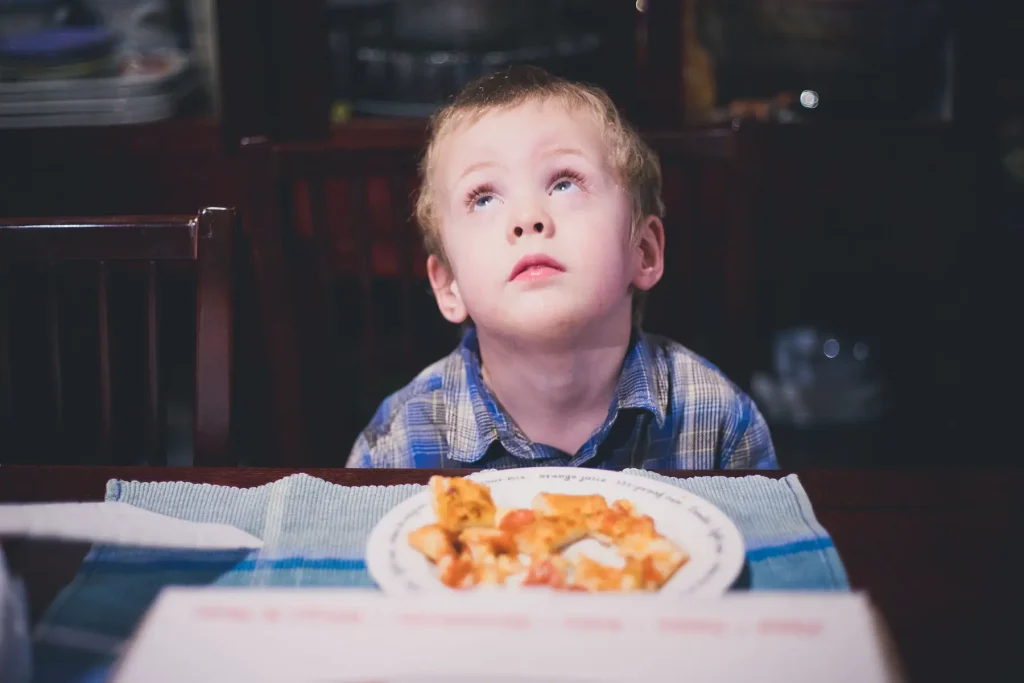


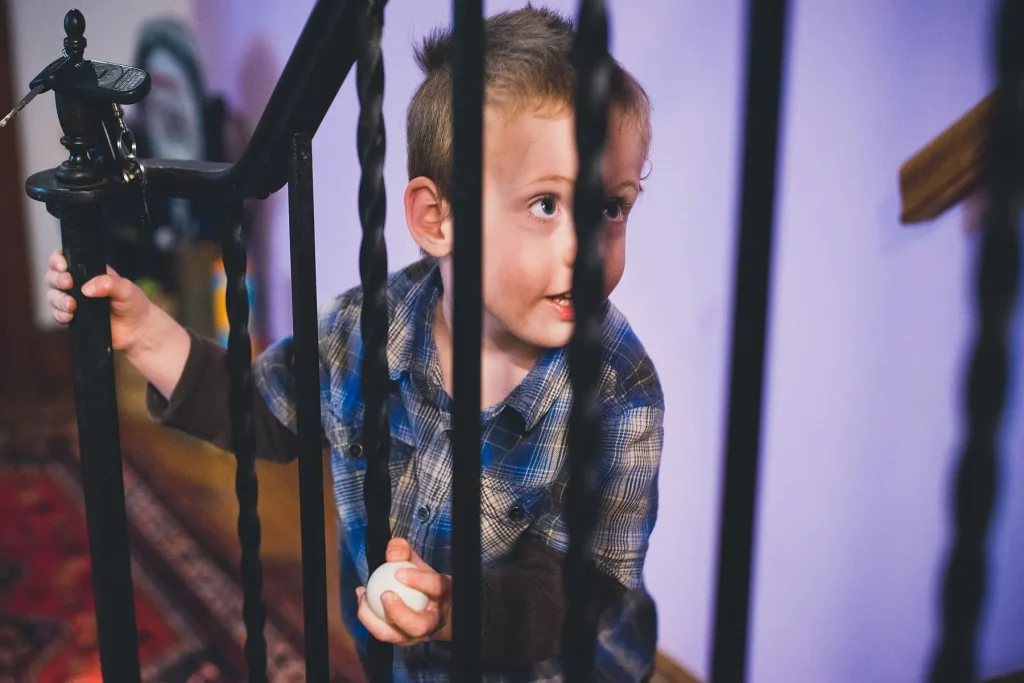
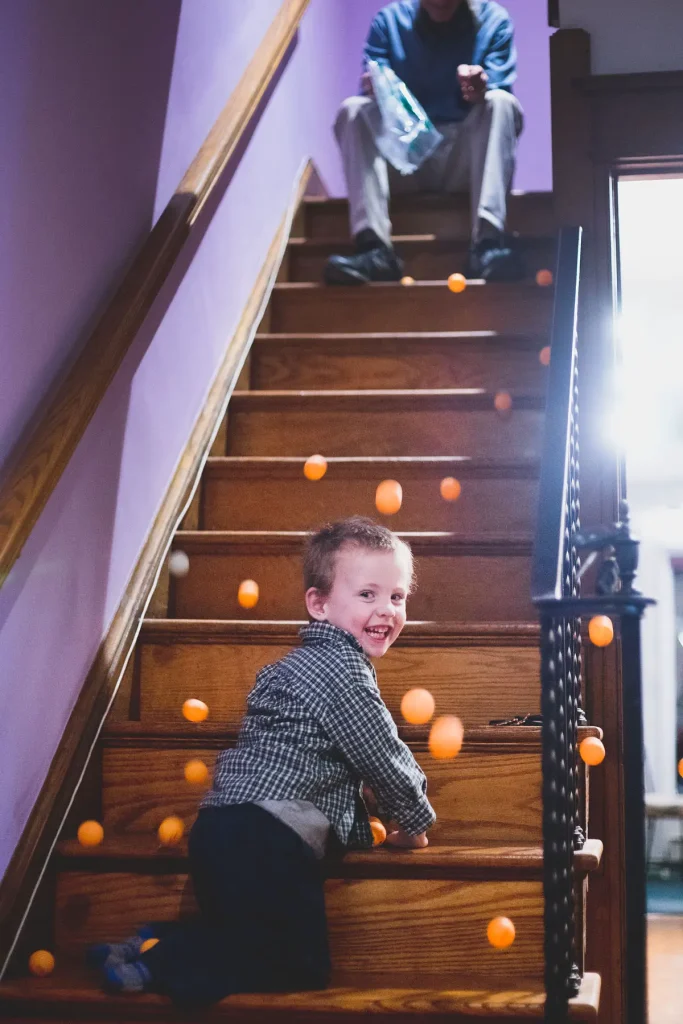




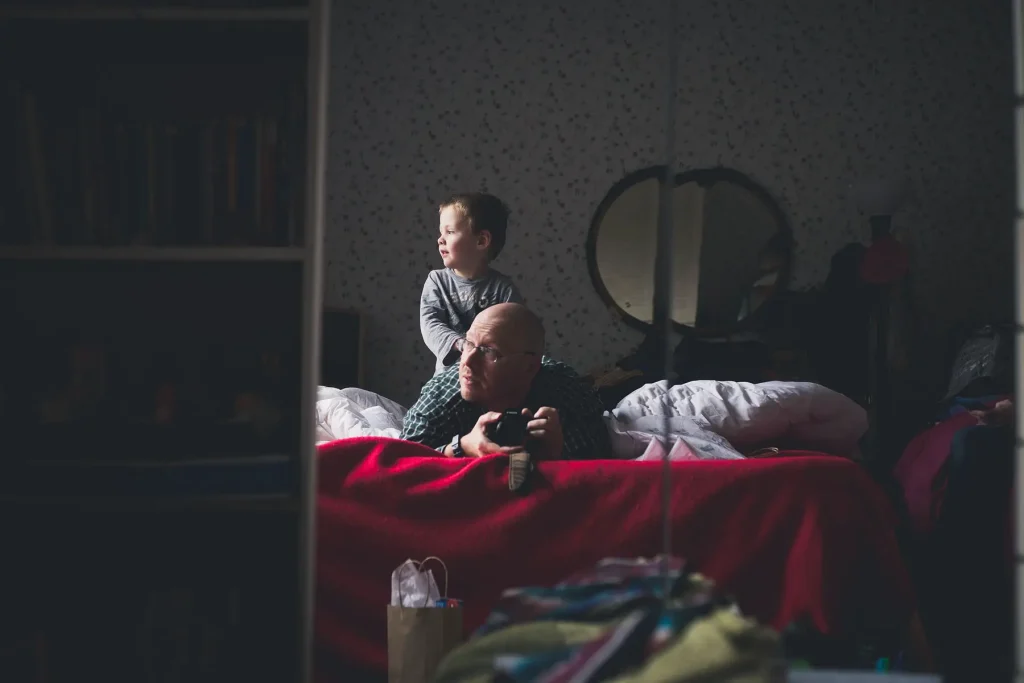

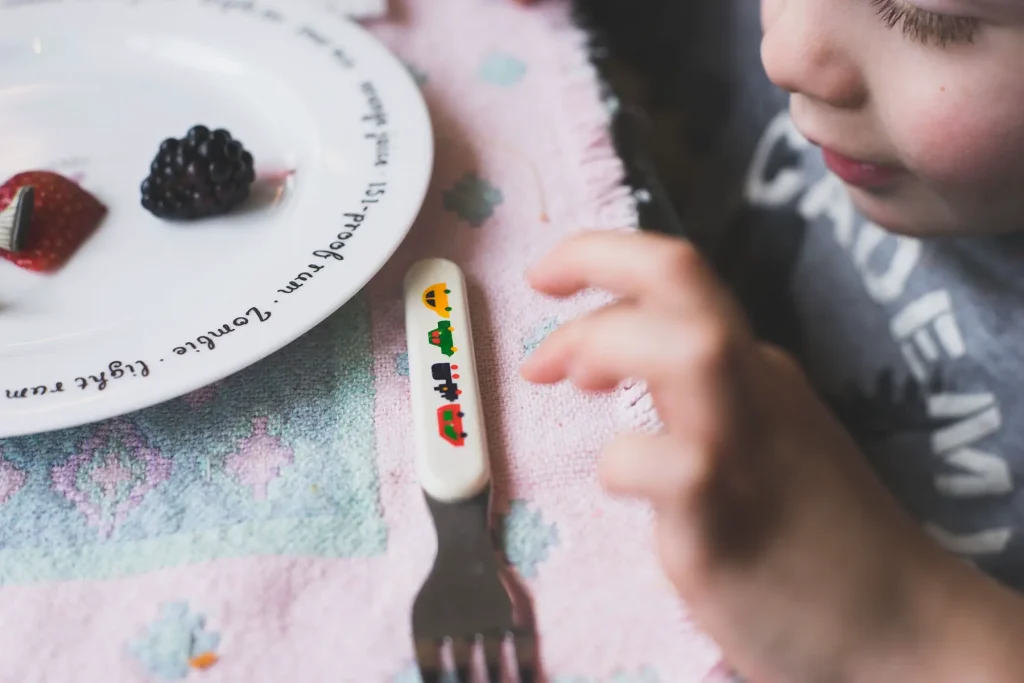

Oddly, I felt much more comfortable with the lens indoors, where the tight spaces of the row house could be leveraged for depth with shallow focus. And as I reviewed the shots in-camera, I felt familiar with what I was seeing, a harkening back to my misspent youth and all the cheap fifties I had used.
There’s a certain rectitude to this lens. It makes you want to stand up a little straighter as you’re shooting, because it’s not going to forgive poor form. It’s so sharp, and the depth of field so shallow, that it’s blatant when you miss the focus. And you can’t blame your skewed lines on distortion, because there’s none. There’s no glow, there’s no softness. There’s no character to cover your ass.
I am so glad I learned to shoot this way.
I was not born a gearwhore. I grew into it through a long, rather rough road paved with Tri-X and cheap fifties. All gear was disposable in those twilight years of film. I never spared a thought for the notion that those lenses might be shaping the way I see.
Thanksgiving day
Thanksgiving day began with a freezing solo excursion to the National Mall, where I felt naked without a wide angle lens. But as I bolted from monument to monument in the bitter wind, I realized a couple of things: First, every photo you ever see from the Mall is taken with a wide angle. And second, just back up. There’s room. Those columns sure look straighter from a distance with a fifty than they would with a twenty-eight up close.
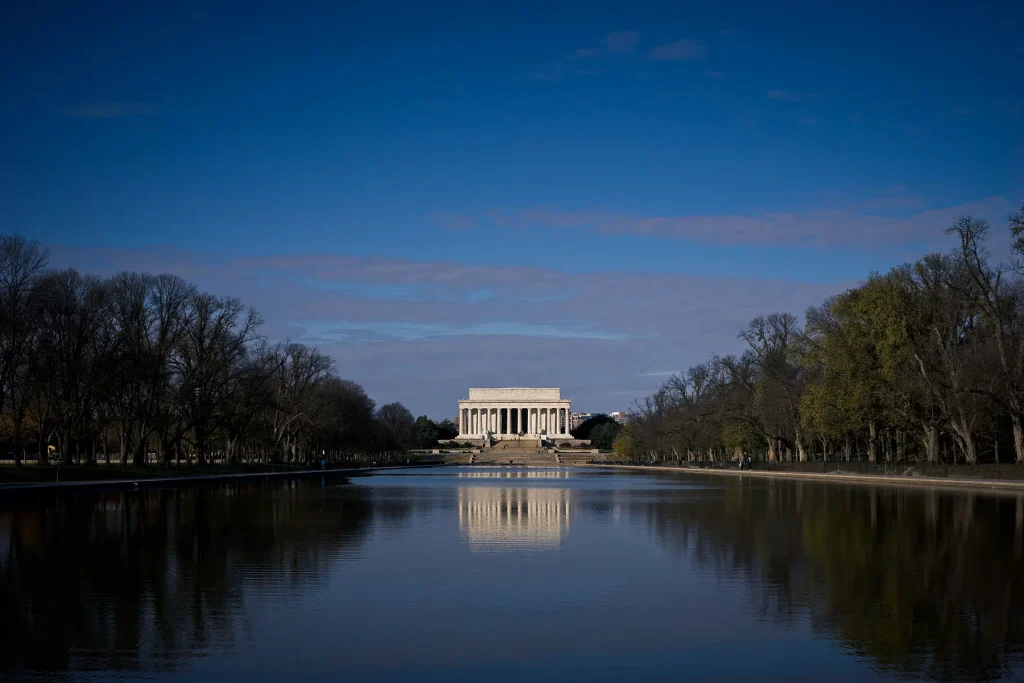
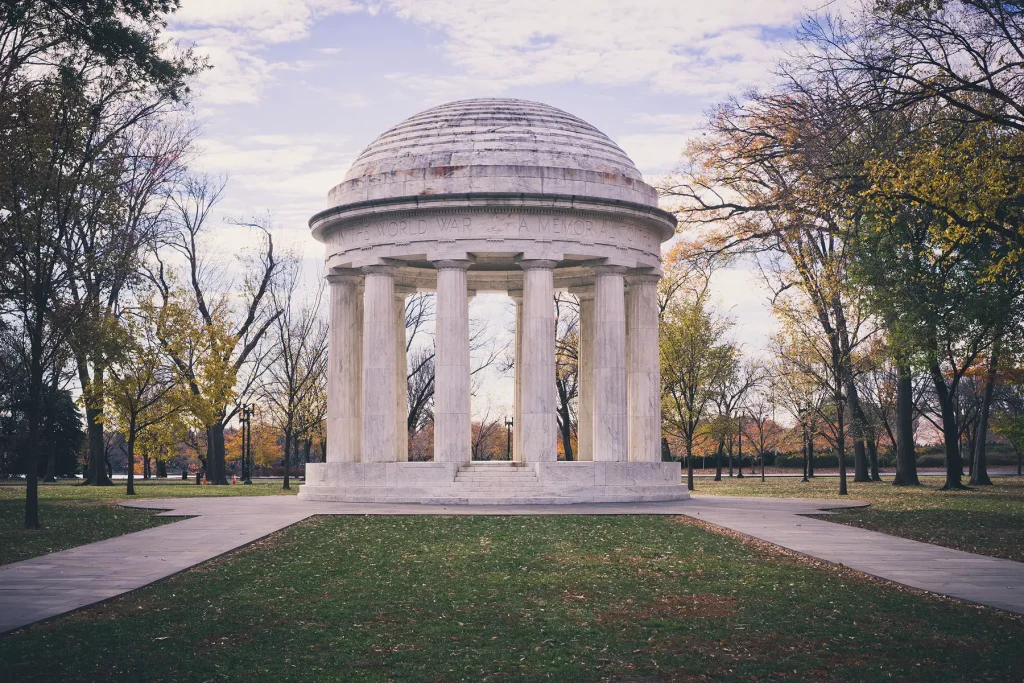
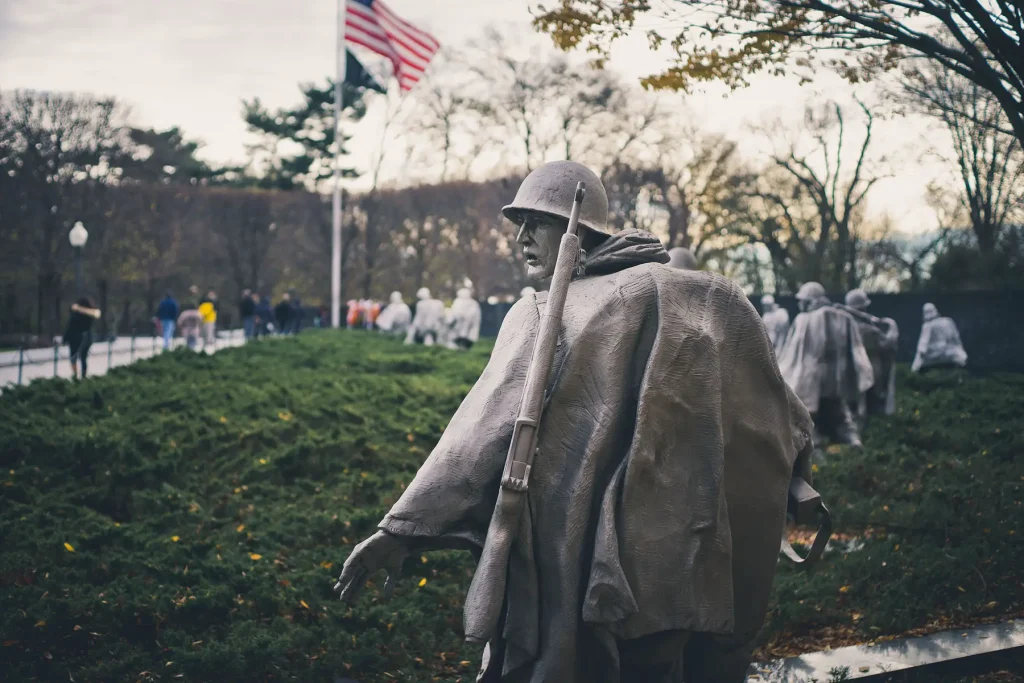
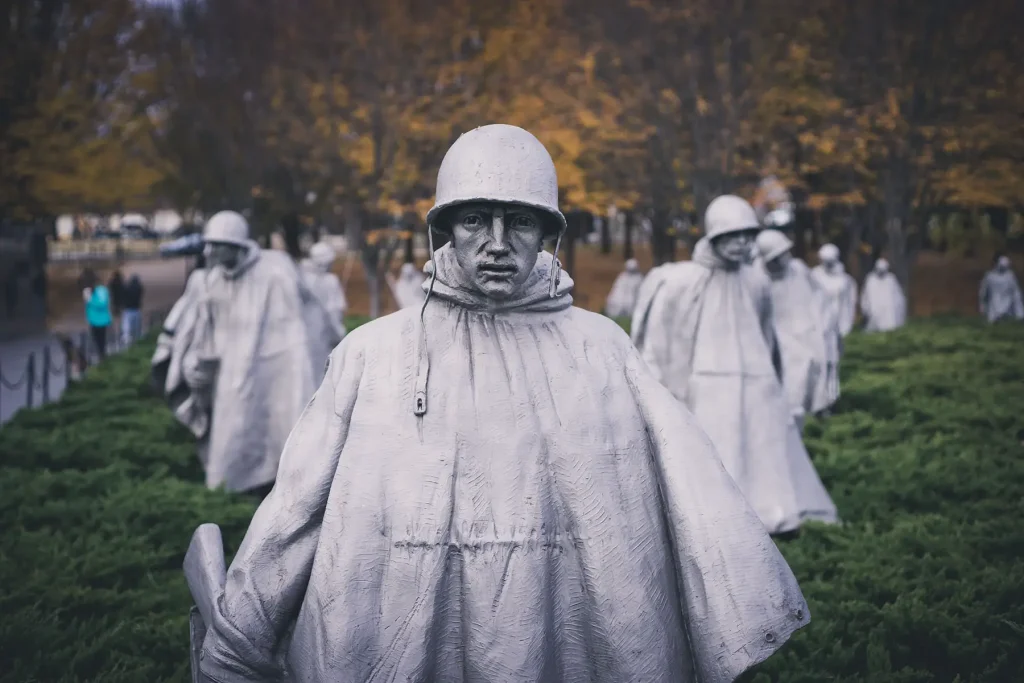
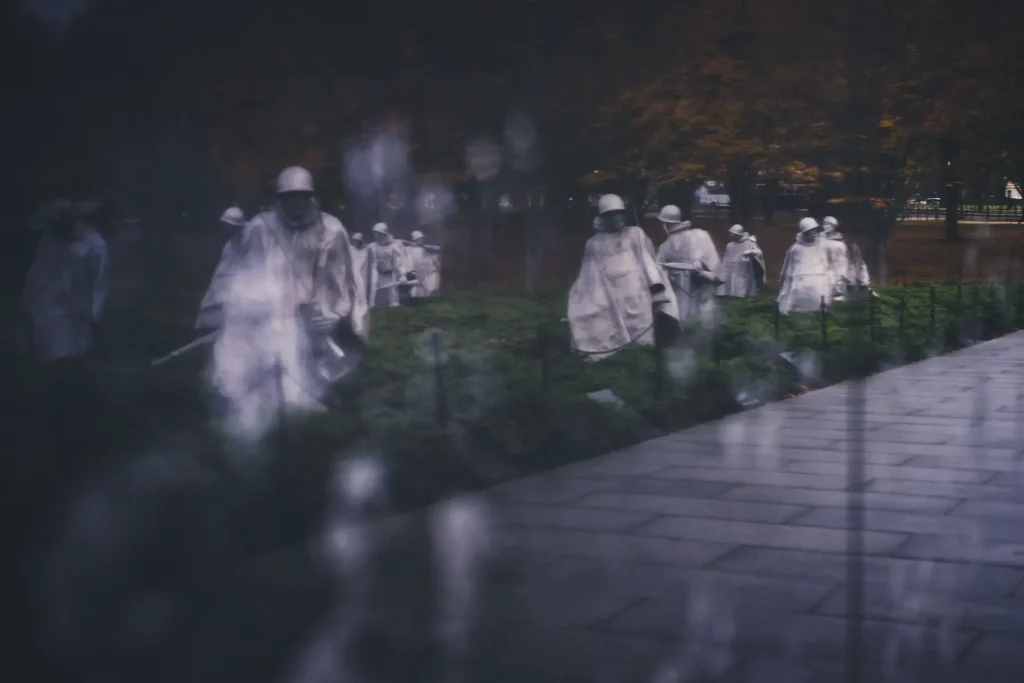
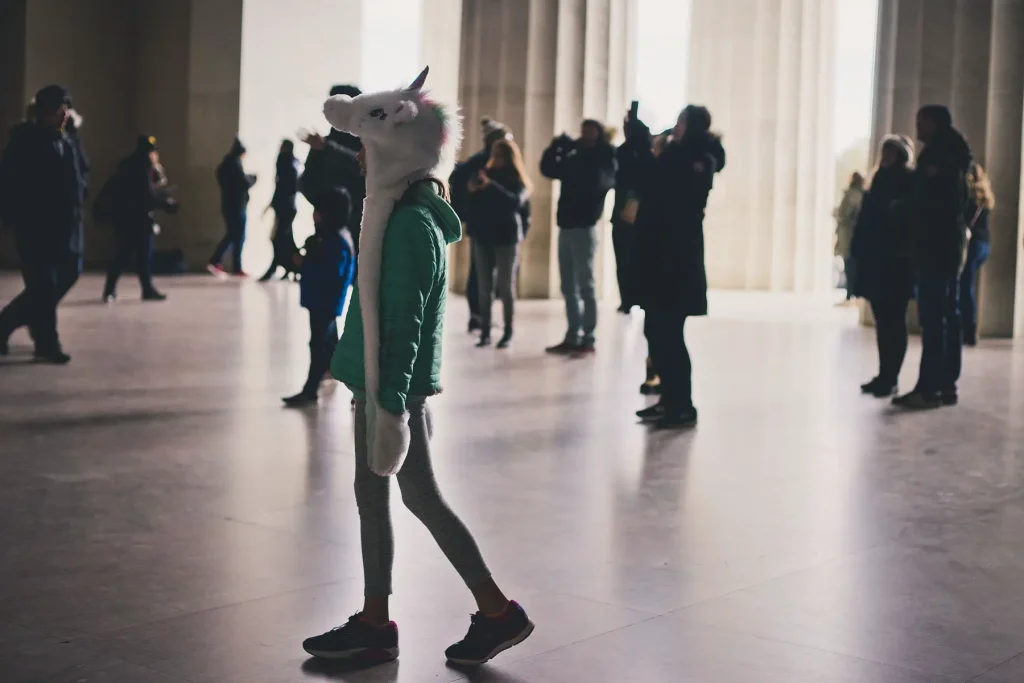
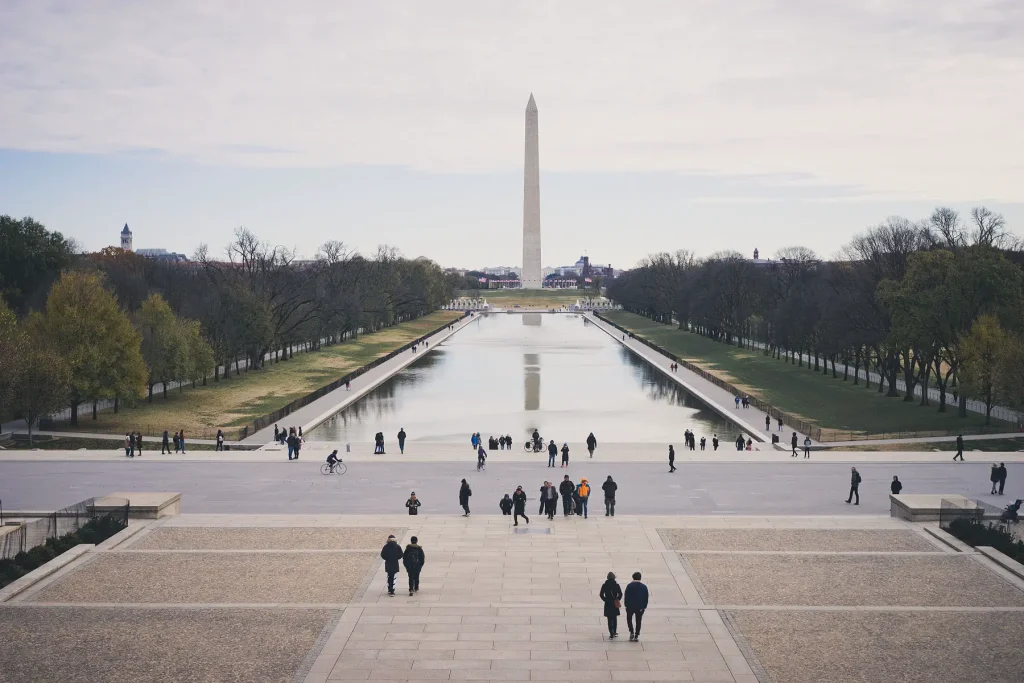
We made our way to dinner with the other side of the family, where the scene was downright raucous compared to the quiet row house. More pianos, other kids, family Atticus had never met. Big groups are not his thing. Wisely, he made a strategic decision to play with Legos by the fireplace and ignore us all.

The kid is continually refreshing. If he doesn’t want to talk to you, he won’t. If he needs time to himself, he’ll take it. The rest of us have to smile and take our privacy where we can get it.
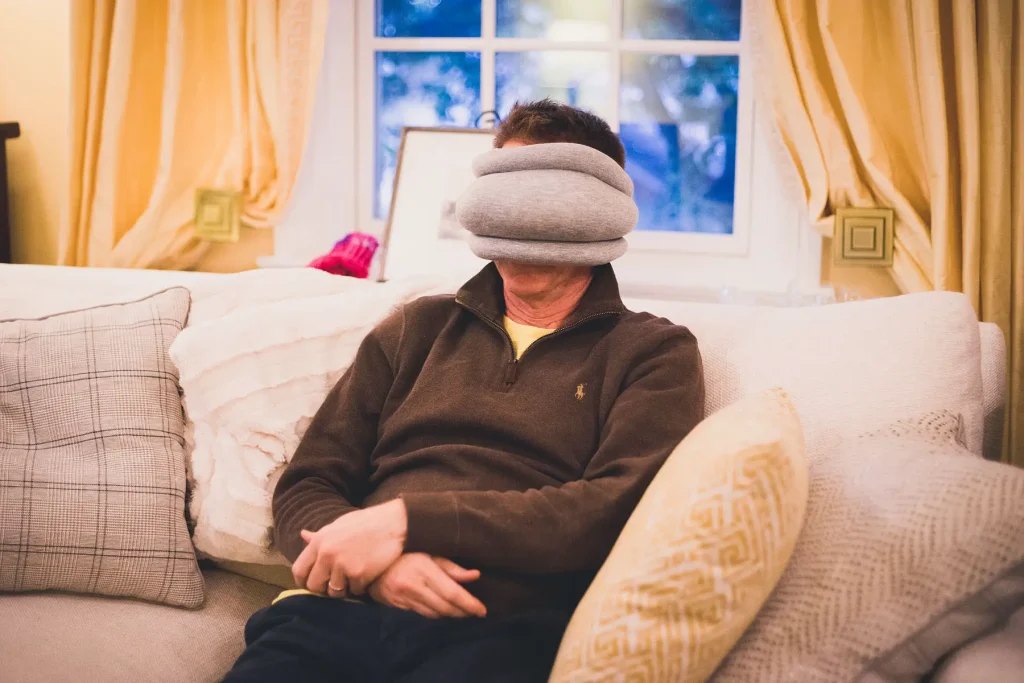
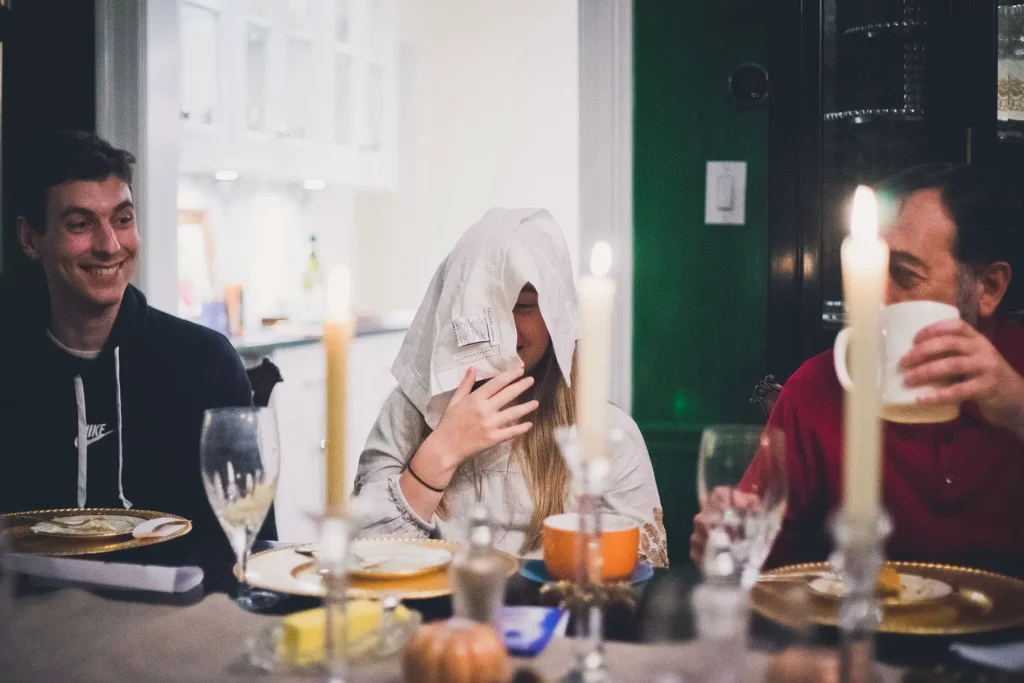
This scene was basically indoor event photography, and that’s the purview of a fast fifty. It’s perfect for portraits that breathe. It captures environments and moments. Would a Noctilux have done better here? Maybe. But even in this light I didn’t have to stretch for shutter speeds. And no matter what lens you use, you’re never going to shoot in candlelight and produce images that look they were made in a studio. The $10,000 difference between the Nikkor and a Noctilux would give you perhaps an edge in sharpness, or a little less noise, but you’re still shooting candids in the dark.
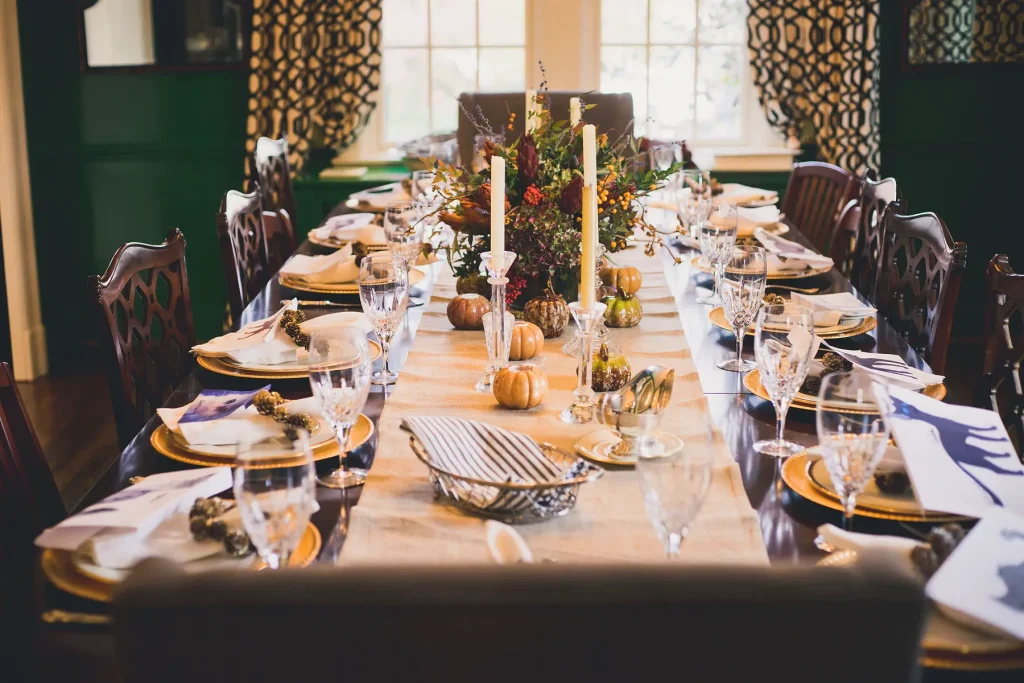
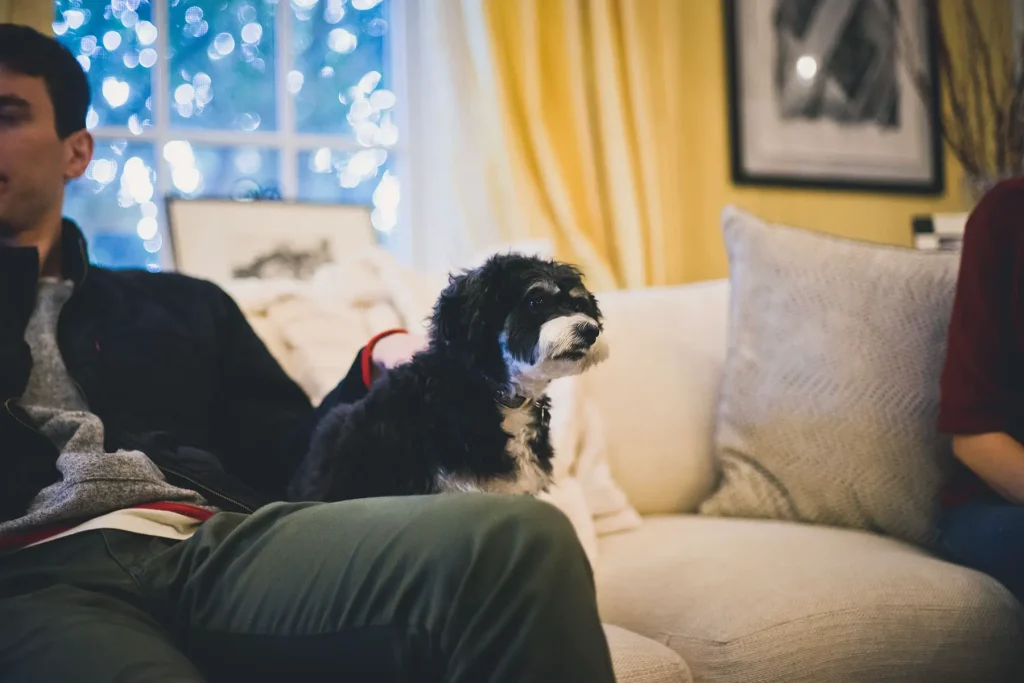

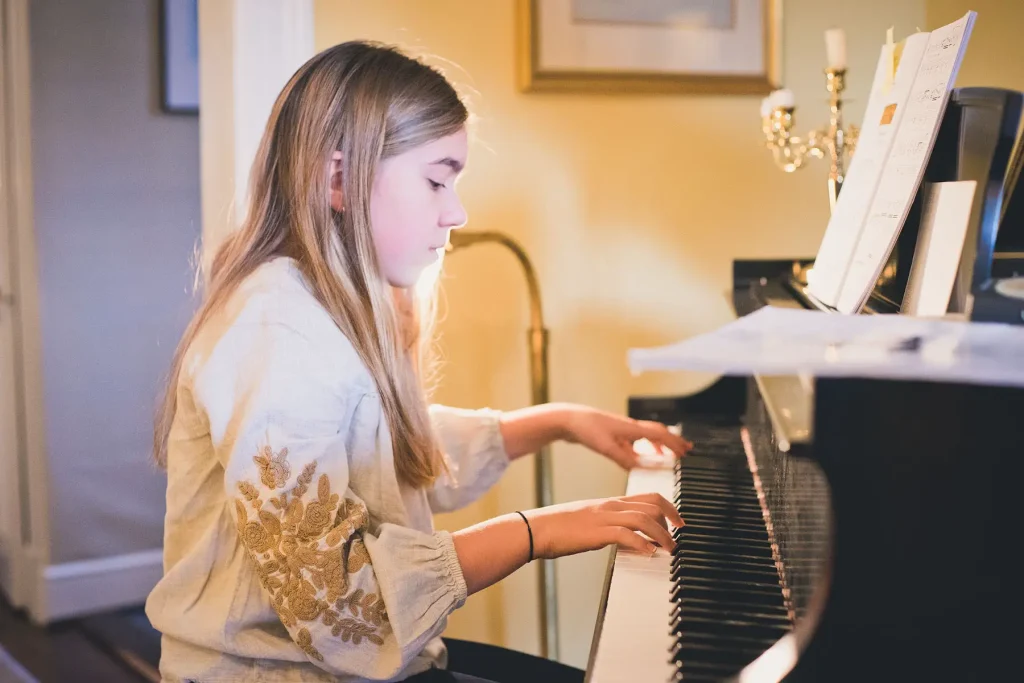

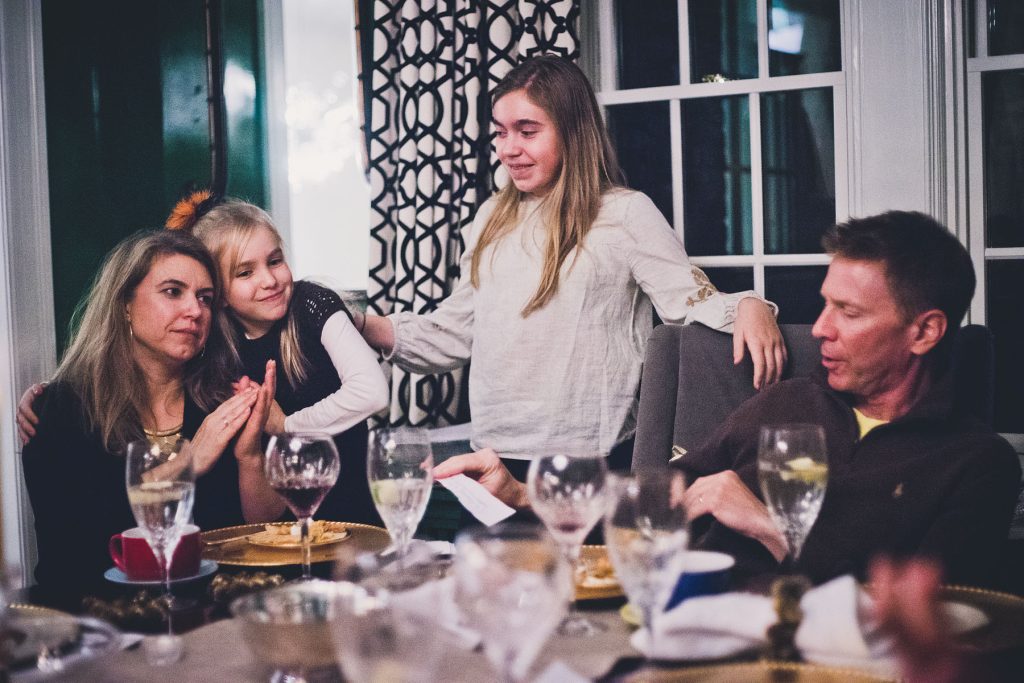
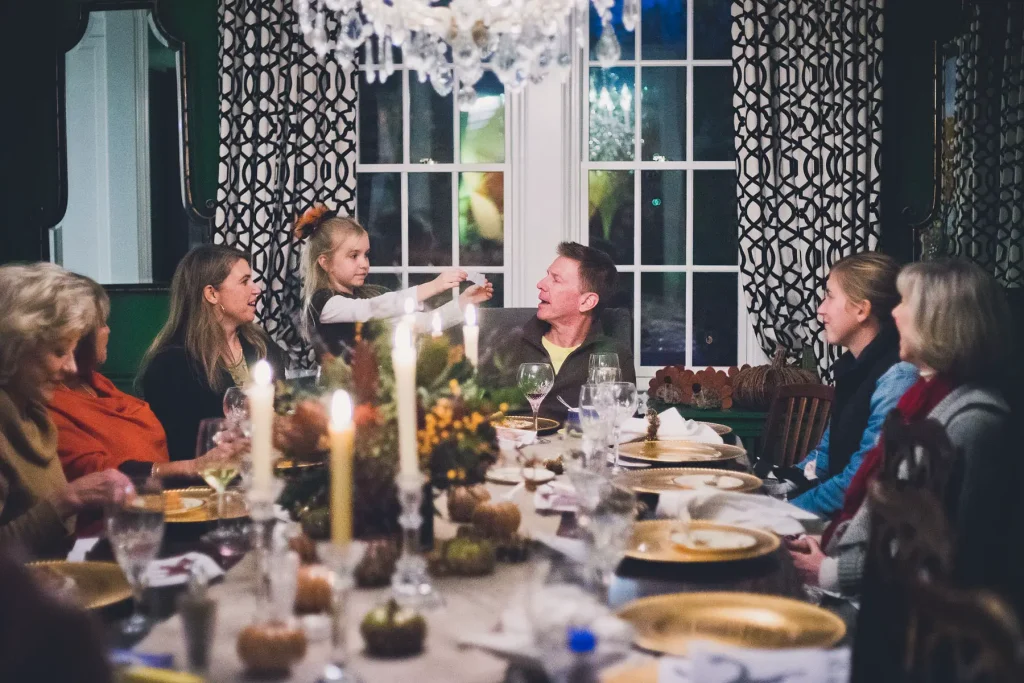
After dinner we took a walk to a playground, and it’s here that I blew the best shot of the trip. My wife took Atticus down the slide. I was too far away. She took him down again, but I didn’t move closer. I’m not sure why. Maybe all those years with a photojournalist’s zoom. Maybe I was just cold. I wish this shot was dead-on and centered, with the circular opening of the slide filling the frame. My wife made it her profile picture and said it’s the best shot I’ve ever gotten of them on a slide. But she’s wrong. It’s terrible and I’ll never forgive myself.
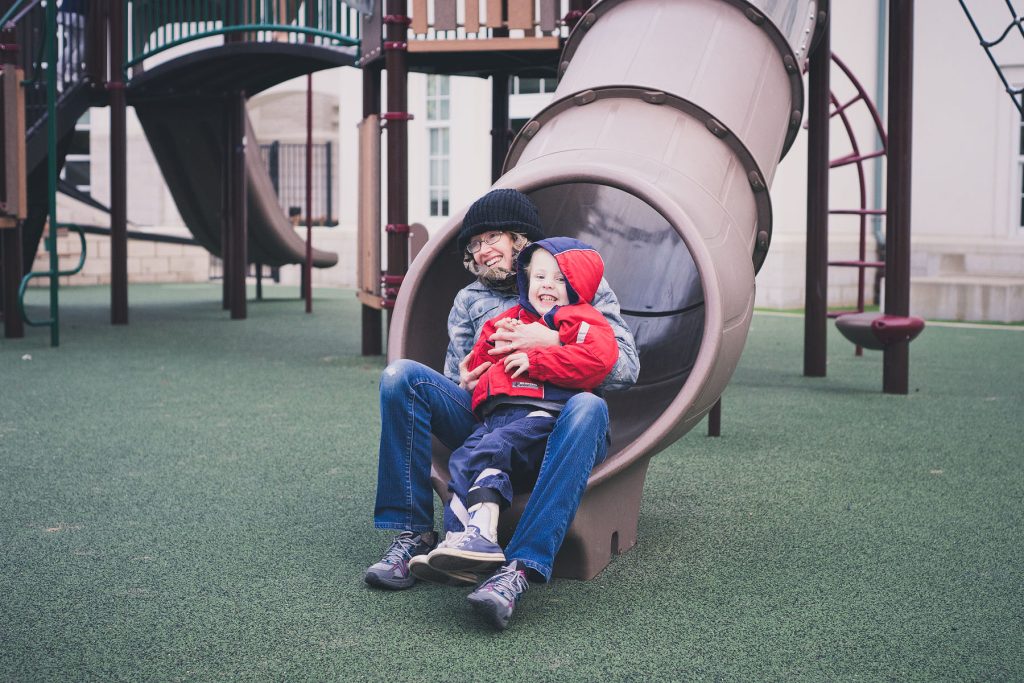
I’m being dramatic, but isn’t this what we do to ourselves? Yeah, sure, these other photos are fine, but the one I MISSED. . . and after all, I would have gotten if if I’d just had my telephoto. Of course it’s not MY fault.
Gear is both our sword and our armor. We blame our failures either on the gear we’re using or on not using the gear we should have. It hurts to realize we failed to do something simple, like anticipate the shot and walk a few steps. But that’s usually how it happens. You don’t realize til the whole thing is over that you missed a moment that was handed to you openly.

A Boring Lens
In my career I’ve learned a lot about a lot of gear. What I learned from shooting a boring lens is that gear is a distraction. And photographers have enough of those already. Personal issues, work issues, the weather, the bugs, the bride’s mom, the dirt in your face as a helicopter lands, the hot stenographer in the government meeting. On and on.
Photography is an act of focus. A meditation. The process of letting go of distractions to focus on moments.

I have come to love this lens because it is transparent. I don’t think about it. I just watch for moments. And hexagons. But – and maybe this is just gear worship – I’m actually growing to love those, too.
I won’t pretend I’ve renounced the search for my holy grail fifty. But I’m not quite sure what improvements I’m looking for. I can’t say the same of myself. I’ll keep going until my eyes fail, but I’ll never get all the moments that are given to me.
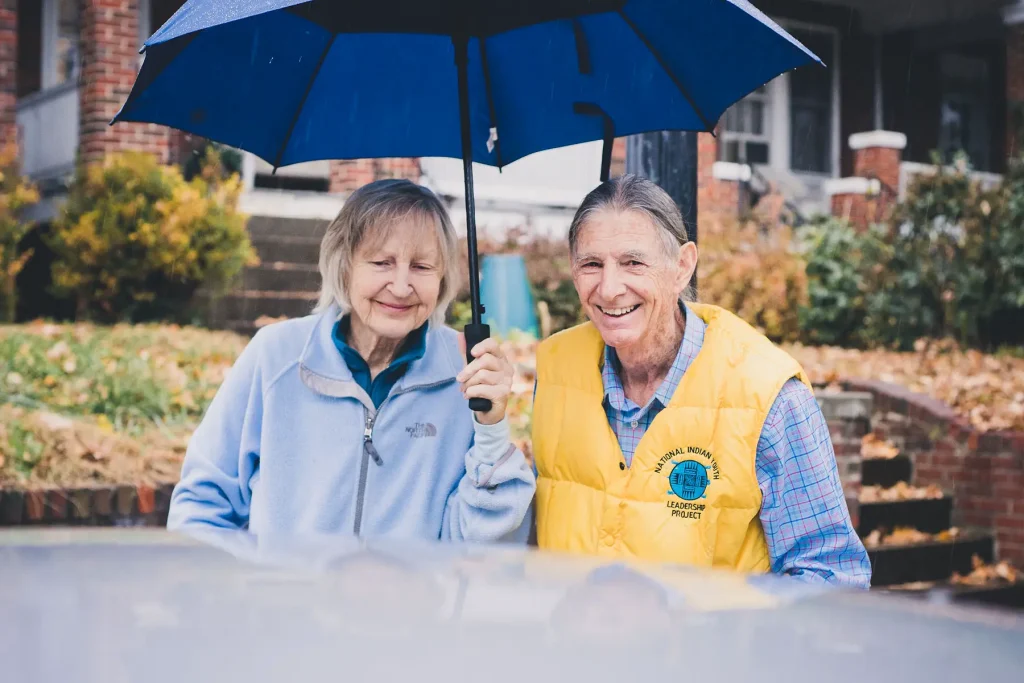
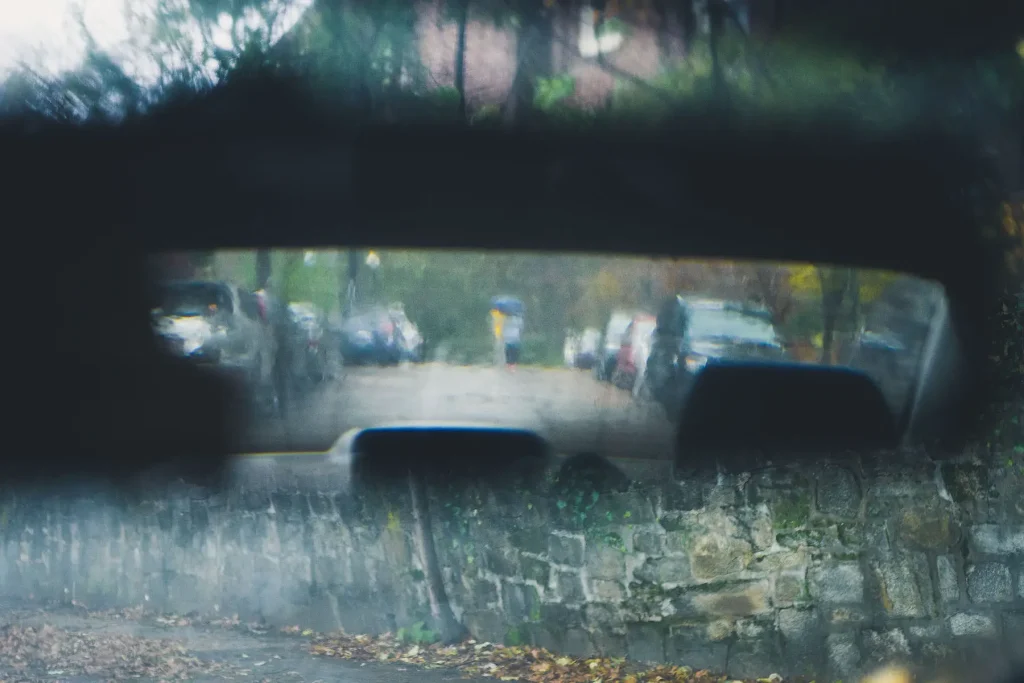
Website: maxcooperphoto.com
Instagram: maxcooperavl
Share this post:
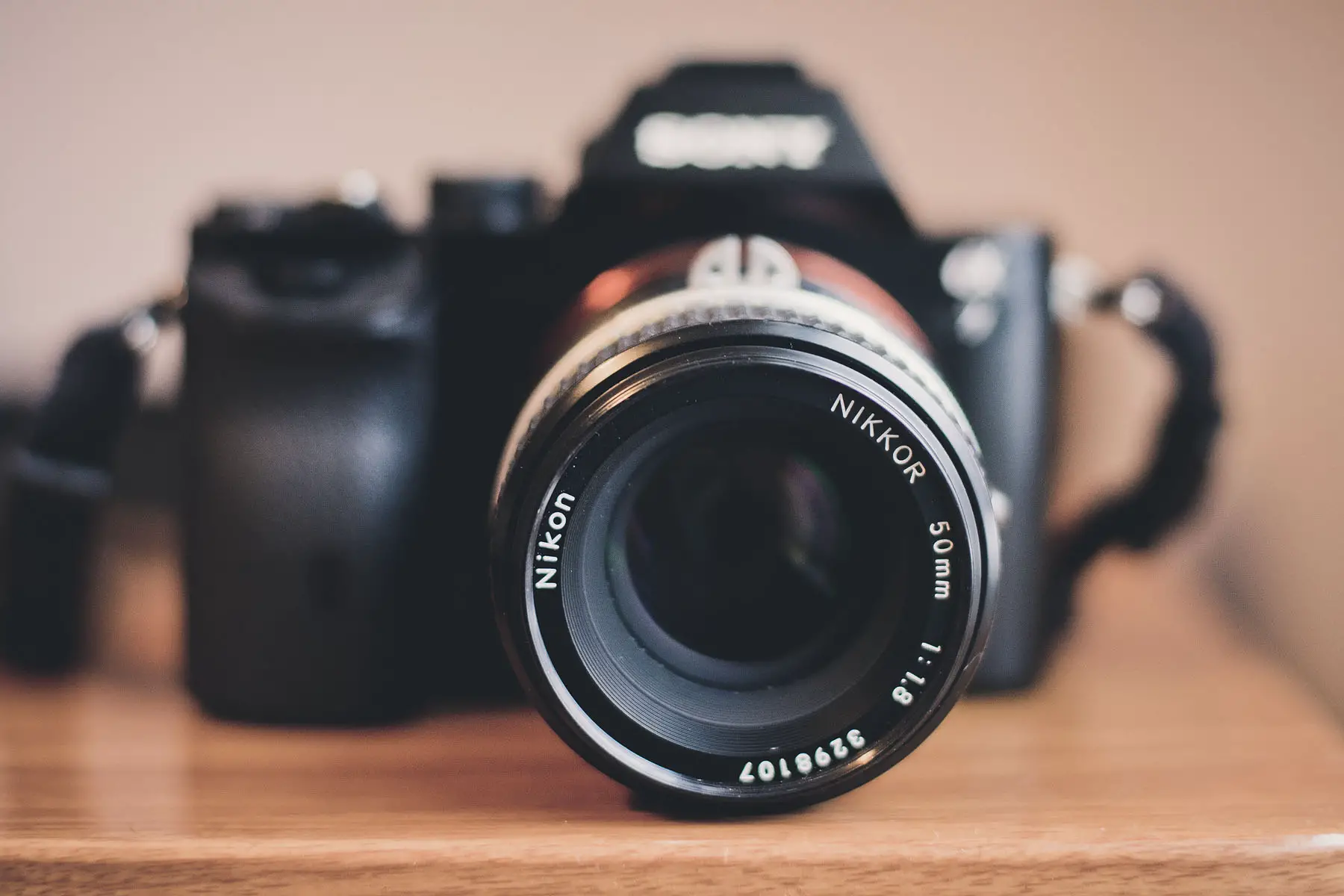
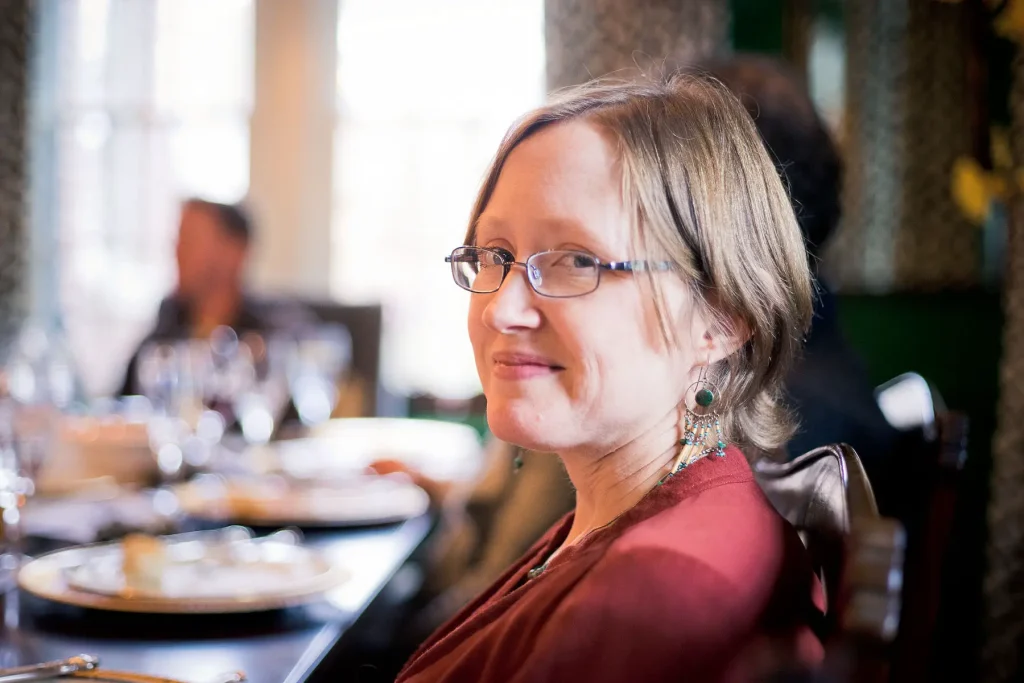
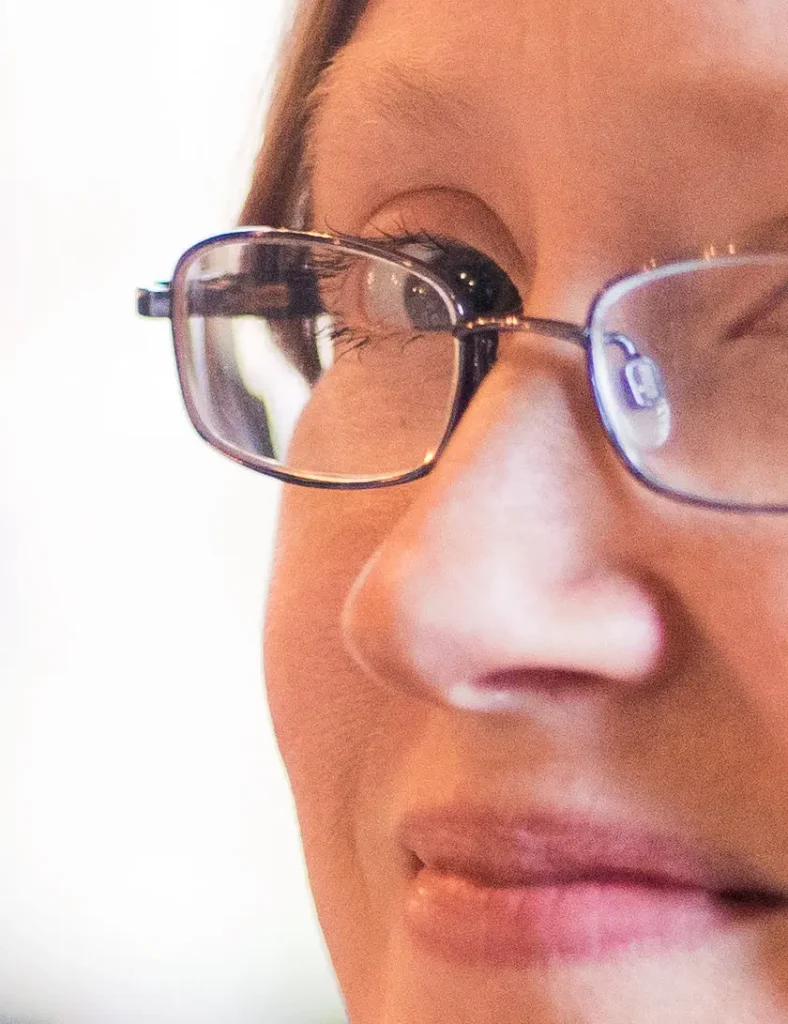
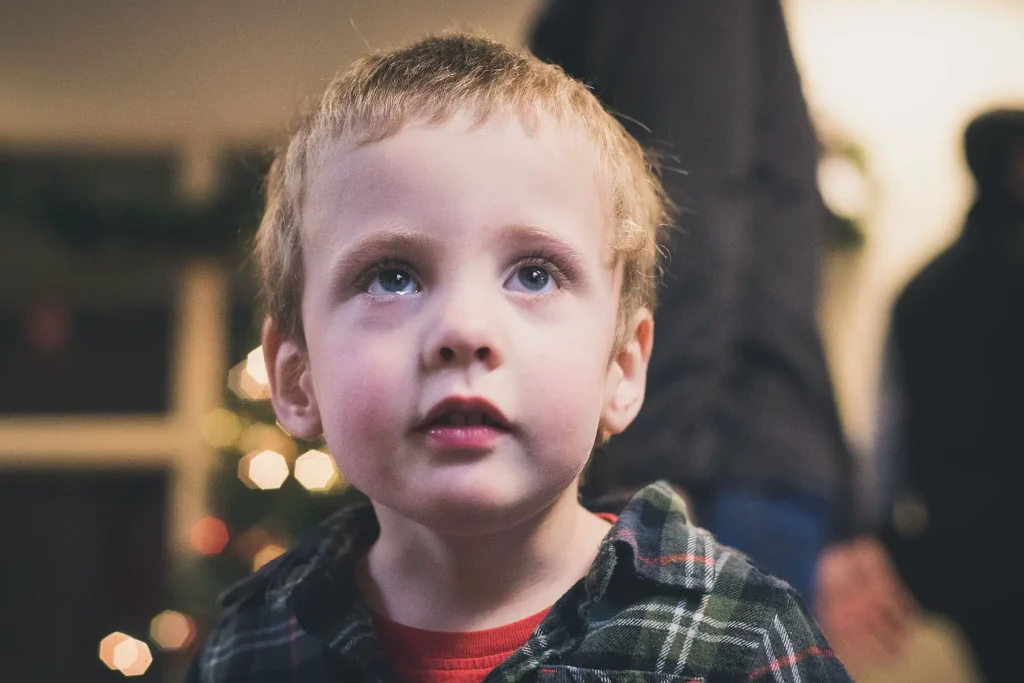
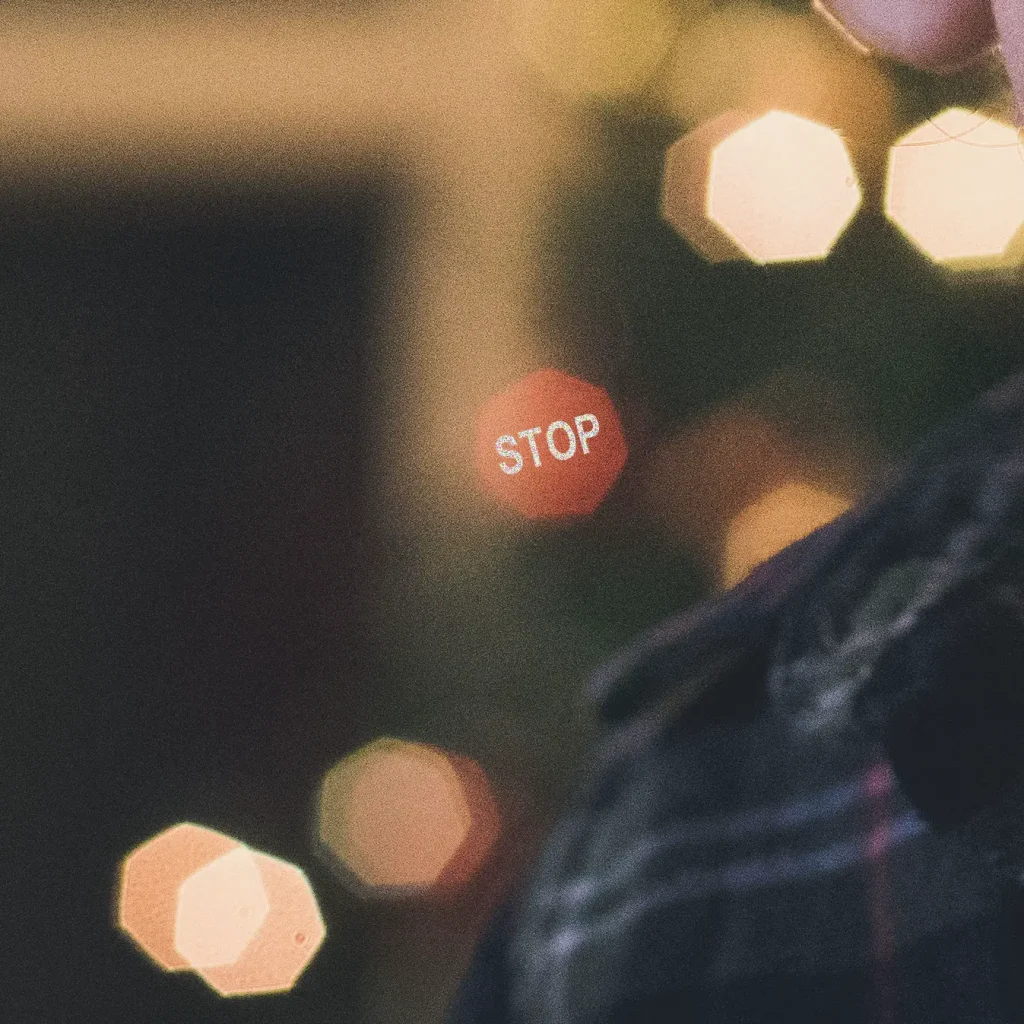
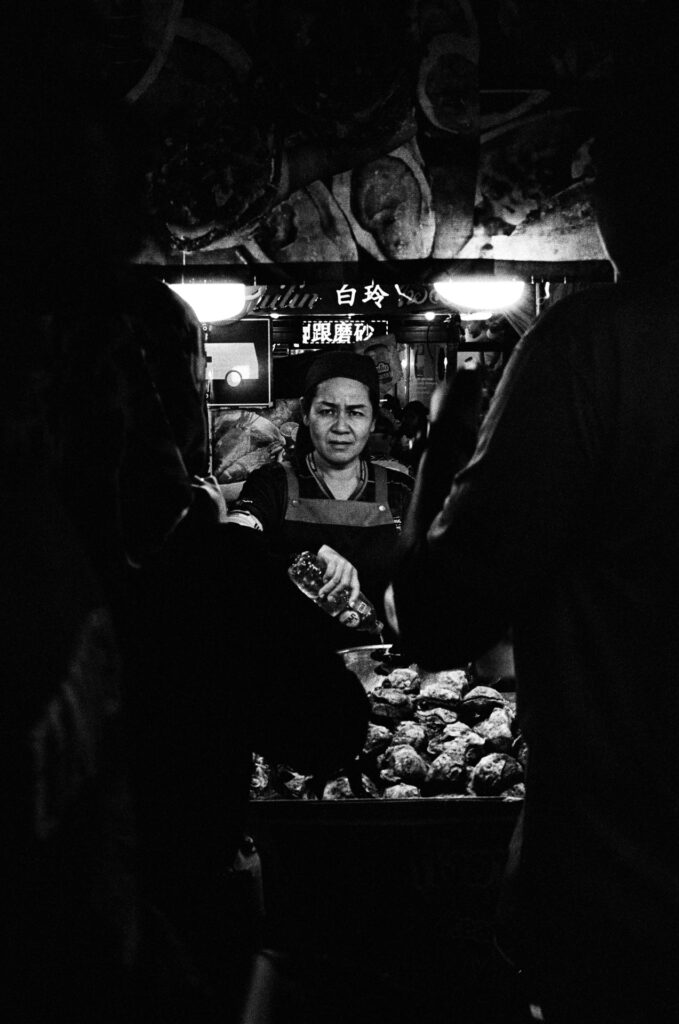
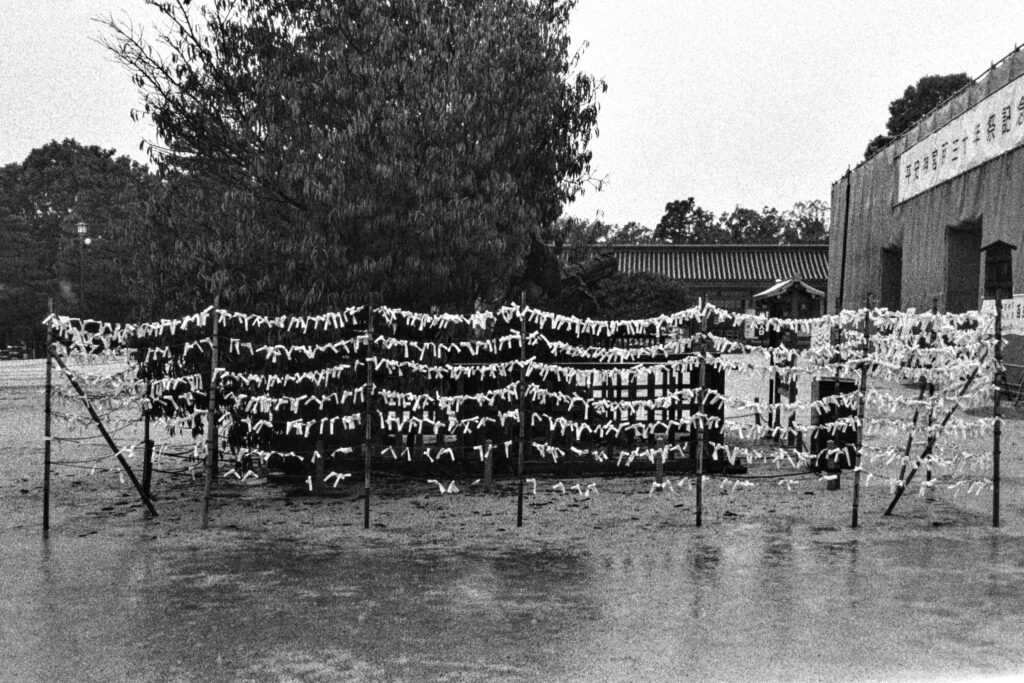
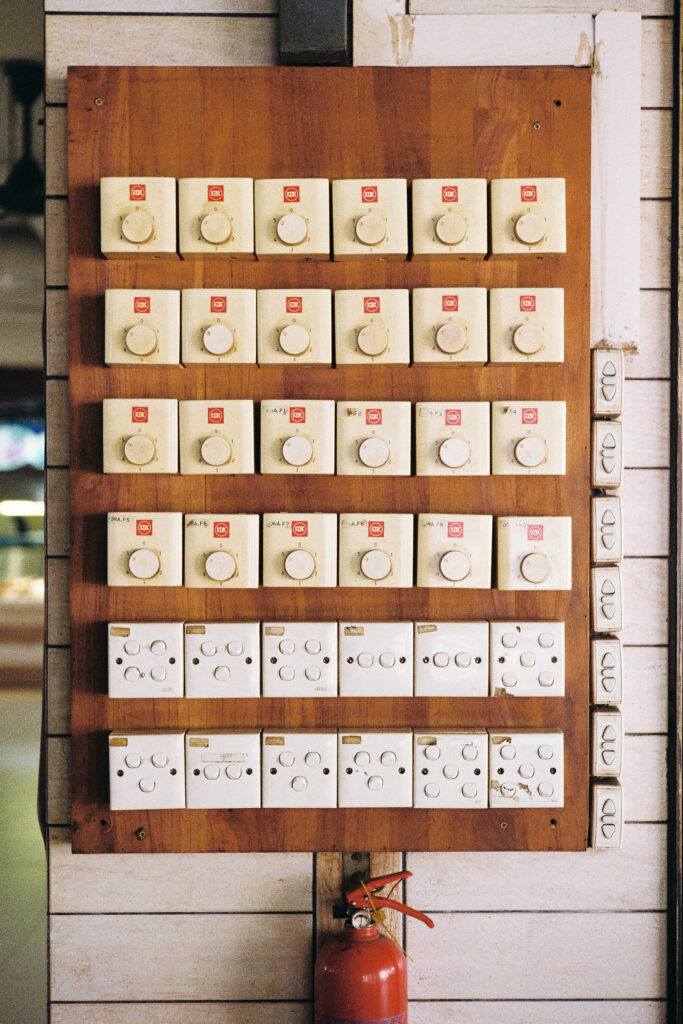
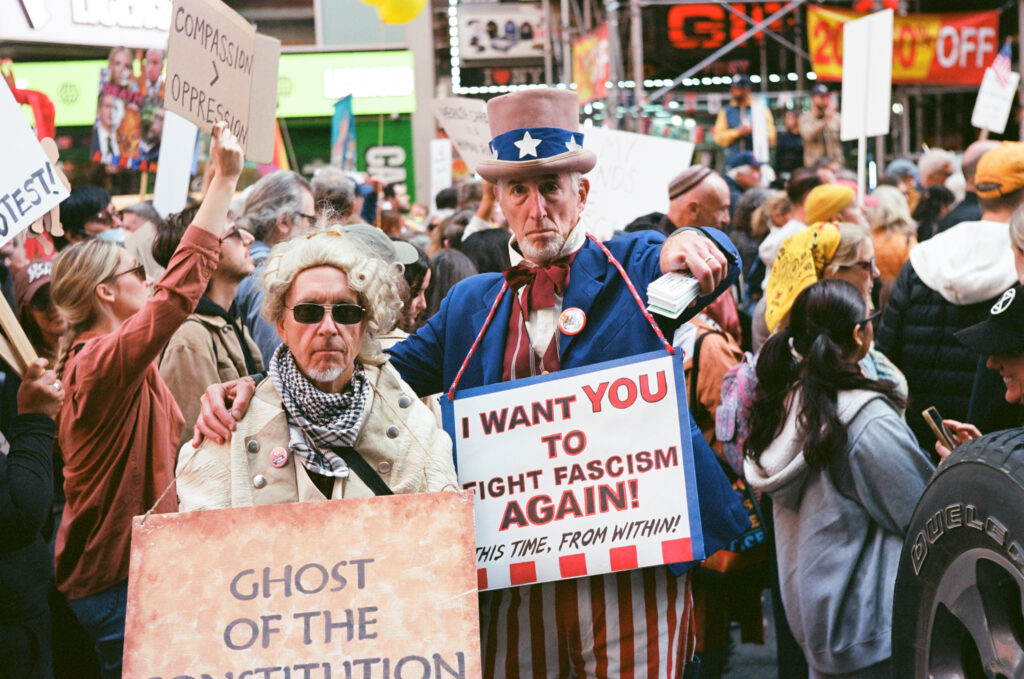




Comments
Ashley Carr on Nikon 50mm f/1.8 – Returning to the Cheap Fifty: A Homecoming – By Max Cooper
Comment posted: 25/01/2019
I'm pretty fussy about my 50's for both my Leica and my Nikon F2. I've tried a lot from bargain basement to bona fide high end. Ultimately I ended up with probably the most unloved (dismissed) 50's for both my systems.
Leica M2 -Voigtlander VM Vintage Line 50mm F/3.5
Nikon F2 - Nikkor 50mm F2.0 (Both pre ai and ai variants).
Many skip straight to the Nikkor 50/1.8 as its as cheap as the F/2.0 and must be better because its faster right? Wrong! The F2.0 is the ultimate forgotten Nikon 50mm yet betters the 1.8 in every department. Very sharp, no distortion, and better at F2 than the 1.8 is at 1.8 (if anyone thinks they're actually gaining a working advantage for speed going for the 1.8 over the 2.0....they're not).
Had a few 1.8's now I've got a few 2.0's. The difference is slight but there is a difference and enough of one to make me switch (and write this comment).
Comment posted: 25/01/2019
Comment posted: 25/01/2019
Philip Lewis Lambert on Nikon 50mm f/1.8 – Returning to the Cheap Fifty: A Homecoming – By Max Cooper
Comment posted: 25/01/2019
Phil
Richard Byrne on Nikon 50mm f/1.8 – Returning to the Cheap Fifty: A Homecoming – By Max Cooper
Comment posted: 25/01/2019
What you capture so very well is the simplicity of affection.
Theirs for each other, and yours for them.
Wonderful - but by contrast, how the hell you manage at weddings, without so much as a basic flak jacket, I cannot imagine.
jim rose on Nikon 50mm f/1.8 – Returning to the Cheap Fifty: A Homecoming – By Max Cooper
Comment posted: 25/01/2019
Christer Brandt on Nikon 50mm f/1.8 – Returning to the Cheap Fifty: A Homecoming – By Max Cooper
Comment posted: 25/01/2019
Malcolm Myers on Nikon 50mm f/1.8 – Returning to the Cheap Fifty: A Homecoming – By Max Cooper
Comment posted: 25/01/2019
Bob Locher on Nikon 50mm f/1.8 – Returning to the Cheap Fifty: A Homecoming – By Max Cooper
Comment posted: 25/01/2019
Dave on Nikon 50mm f/1.8 – Returning to the Cheap Fifty: A Homecoming – By Max Cooper
Comment posted: 25/01/2019
Dave.
Nick Lyle on Nikon 50mm f/1.8 – Returning to the Cheap Fifty: A Homecoming – By Max Cooper
Comment posted: 25/01/2019
Carsten Beier on Nikon 50mm f/1.8 – Returning to the Cheap Fifty: A Homecoming – By Max Cooper
Comment posted: 25/01/2019
Tim on Nikon 50mm f/1.8 – Returning to the Cheap Fifty: A Homecoming – By Max Cooper
Comment posted: 25/01/2019
petergreyphotography on Nikon 50mm f/1.8 – Returning to the Cheap Fifty: A Homecoming – By Max Cooper
Comment posted: 25/01/2019
NigelH on Nikon 50mm f/1.8 – Returning to the Cheap Fifty: A Homecoming – By Max Cooper
Comment posted: 25/01/2019
Laurence Kesterson on Nikon 50mm f/1.8 – Returning to the Cheap Fifty: A Homecoming – By Max Cooper
Comment posted: 25/01/2019
A very insightful review of where some of us find ourselves today. I recall in the 70's the general rule of thumb was to "throw away that 50, no real pro would use one." Now I find it to be my main lens. I have an embarrassing collection of 50mm lenses at this point and I feel perfectly fine walking out the door without the 16-35 and 70-200, the staple of my existence for so many decades.
I hope you'll write some more and continue to share your photos. Your insight is refreshing.
Bernhard on Nikon 50mm f/1.8 – Returning to the Cheap Fifty: A Homecoming – By Max Cooper
Comment posted: 25/01/2019
Rob Brown on Nikon 50mm f/1.8 – Returning to the Cheap Fifty: A Homecoming – By Max Cooper
Comment posted: 25/01/2019
Great, great article!!
Christos Theofilogiannakos on Nikon 50mm f/1.8 – Returning to the Cheap Fifty: A Homecoming – By Max Cooper
Comment posted: 25/01/2019
Andrew Rowan on Nikon 50mm f/1.8 – Returning to the Cheap Fifty: A Homecoming – By Max Cooper
Comment posted: 25/01/2019
This line made me laugh too, "Why go on about the emotional subtext of our imagery when we can just look at a 100% crop of a completely banal photo?".
Andy
Daniel Castelli on Nikon 50mm f/1.8 – Returning to the Cheap Fifty: A Homecoming – By Max Cooper
Comment posted: 25/01/2019
Jamie on Nikon 50mm f/1.8 – Returning to the Cheap Fifty: A Homecoming – By Max Cooper
Comment posted: 25/01/2019
Andy R on Nikon 50mm f/1.8 – Returning to the Cheap Fifty: A Homecoming – By Max Cooper
Comment posted: 26/01/2019
Indra Rosalia on Nikon 50mm f/1.8 – Returning to the Cheap Fifty: A Homecoming – By Max Cooper
Comment posted: 26/01/2019
Now, I sell almost all of my gears except a Fujifilm X100. With a fixed 23mm, of course, there's a lot of missed photographic chance. But hey, we don't have to capture every moment, right? Life is not a contest.
Less is more. Apparently, I kinda grow up. Maybe, because I still love DragonBall Z to the deepest heart.
Thank you for your piece of heartful writing, Max. Greetings from Jakarta, Indonesia.
Nick Orloff on Nikon 50mm f/1.8 – Returning to the Cheap Fifty: A Homecoming – By Max Cooper
Comment posted: 26/01/2019
devlin cook on Nikon 50mm f/1.8 – Returning to the Cheap Fifty: A Homecoming – By Max Cooper
Comment posted: 26/01/2019
Ted Ostrowski on Nikon 50mm f/1.8 – Returning to the Cheap Fifty: A Homecoming – By Max Cooper
Comment posted: 26/01/2019
jeremy north on Nikon 50mm f/1.8 – Returning to the Cheap Fifty: A Homecoming – By Max Cooper
Comment posted: 26/01/2019
Arthur Fangou on Nikon 50mm f/1.8 – Returning to the Cheap Fifty: A Homecoming – By Max Cooper
Comment posted: 26/01/2019
Danny on Nikon 50mm f/1.8 – Returning to the Cheap Fifty: A Homecoming – By Max Cooper
Comment posted: 26/01/2019
Peter Boorman on Nikon 50mm f/1.8 – Returning to the Cheap Fifty: A Homecoming – By Max Cooper
Comment posted: 26/01/2019
I have a Nikkor 50/1.8 AF-D plastic fantastic and I like it, I think for many of the same reasons as Max likes the earlier incarnation of basically the same optical design: it's straightforward and 'honest'. And it somehow feels a lot less plastic with an old pre-AI era metal lens hood on it ;)
Sroyon on Nikon 50mm f/1.8 – Returning to the Cheap Fifty: A Homecoming – By Max Cooper
Comment posted: 28/01/2019
Sroyon on Nikon 50mm f/1.8 – Returning to the Cheap Fifty: A Homecoming – By Max Cooper
Comment posted: 29/01/2019
Shubroto Bhattacharjee on Nikon 50mm f/1.8 – Returning to the Cheap Fifty: A Homecoming – By Max Cooper
Comment posted: 08/01/2021
And Sroyon spotted the 7-bladed aperture — well done!
Braden on Nikon 50mm f/1.8 – Returning to the Cheap Fifty: A Homecoming – By Max Cooper
Comment posted: 19/08/2023